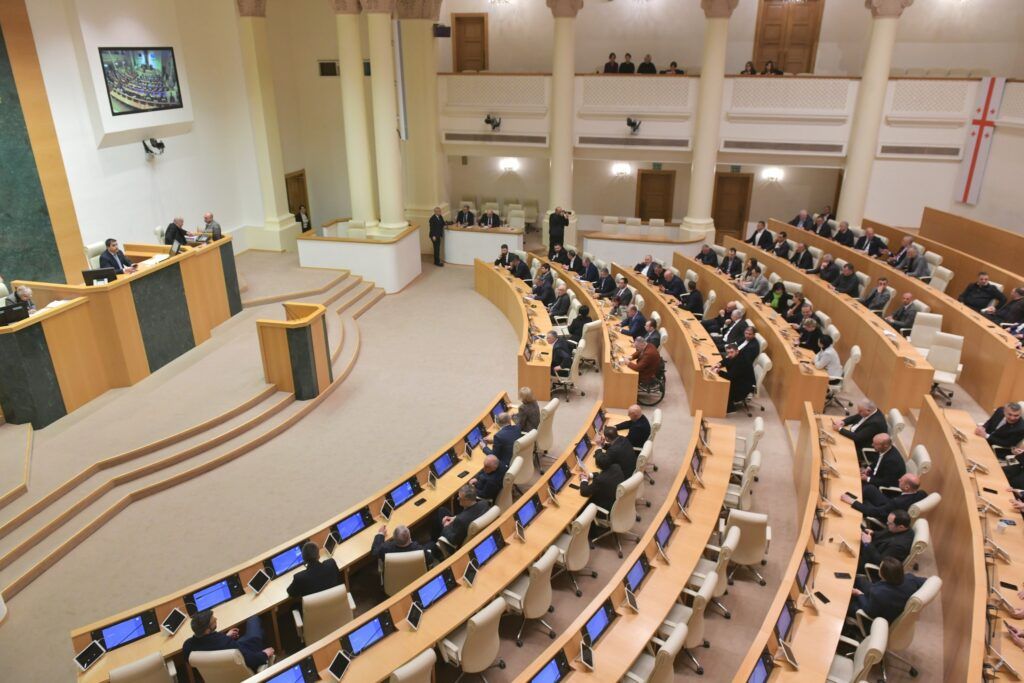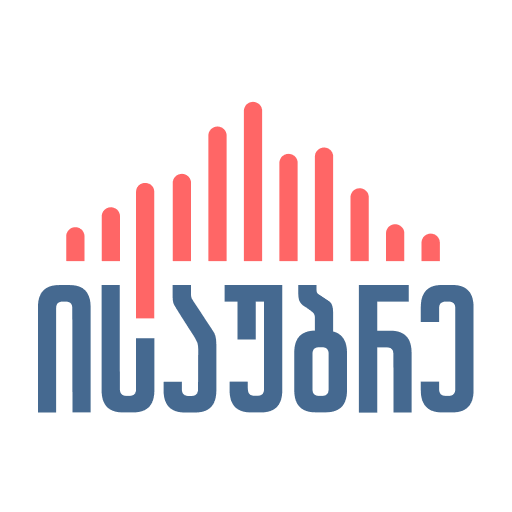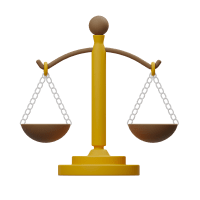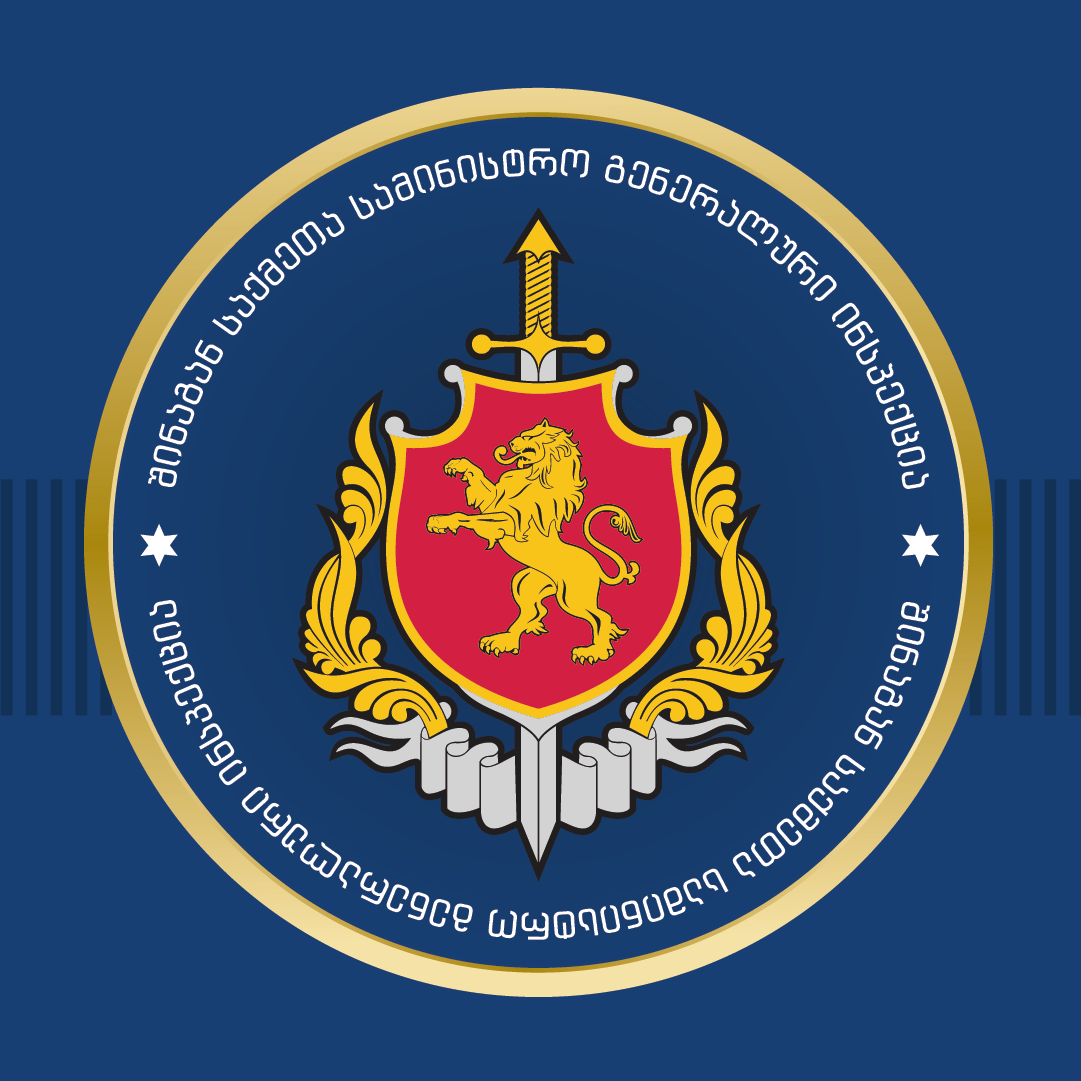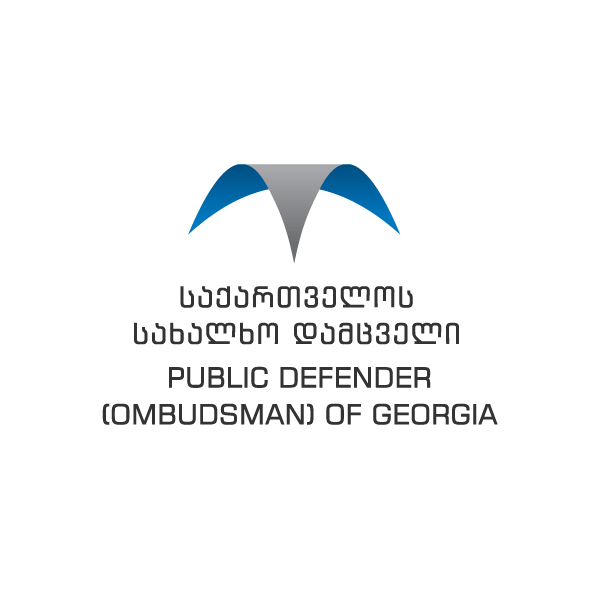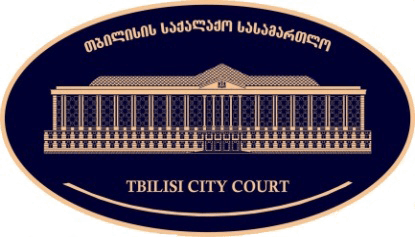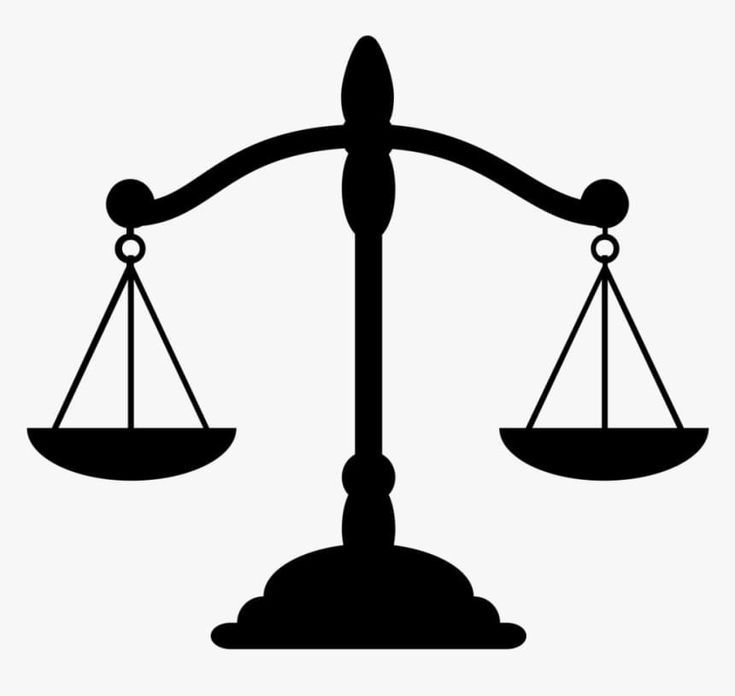Chapter V: After the Elections
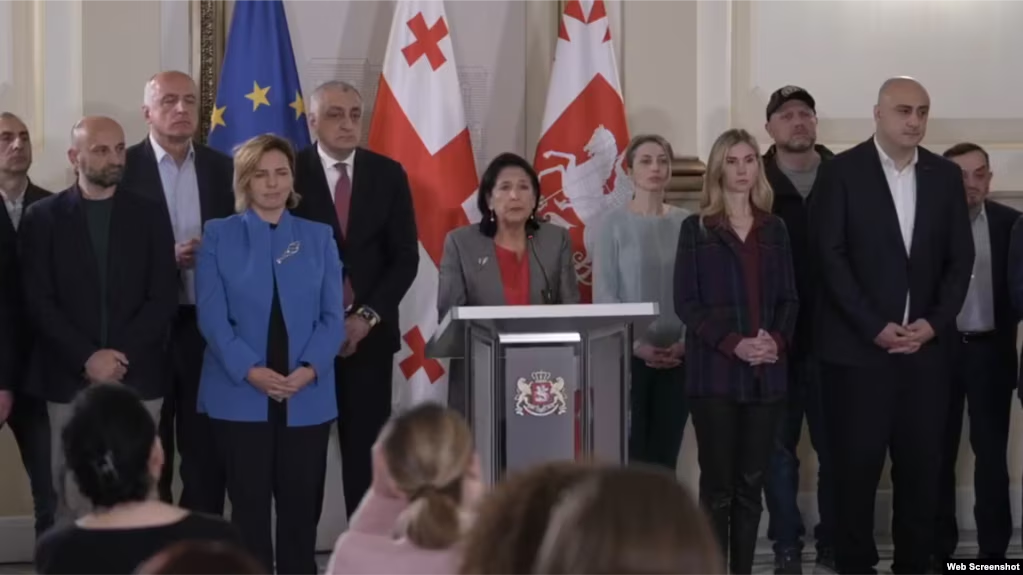
October 27

"I do not recognize these elections, this cannot be recognized," the president said. He thanked all those voters "who voted for Georgia's European choice." According to his own assessment, the October 26 parliamentary elections were "total fraud," "total seizure of votes."
October 28
“We do not recognize the election results” – two days after the October 26 parliamentary elections, Georgian citizens gathered in front of the parliament to express this common position. “You did not lose the elections! They stole your vote and tried to steal your future, but no one has the right to do this, you will not give anyone the right to do this!” – this is how the President of Georgia, Salome Zurabishvili, addressed the citizens gathered in front of the parliament.
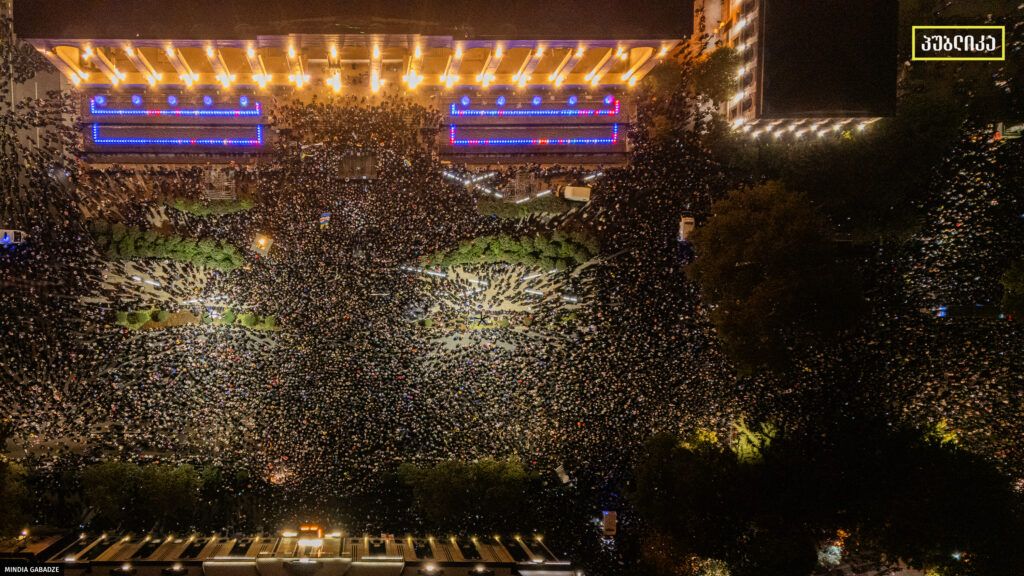
Speaking on stage, the parties that overcame the barriers declared to the public that they do not recognize the election results, will not enter parliament, and demand an investigation and new elections.

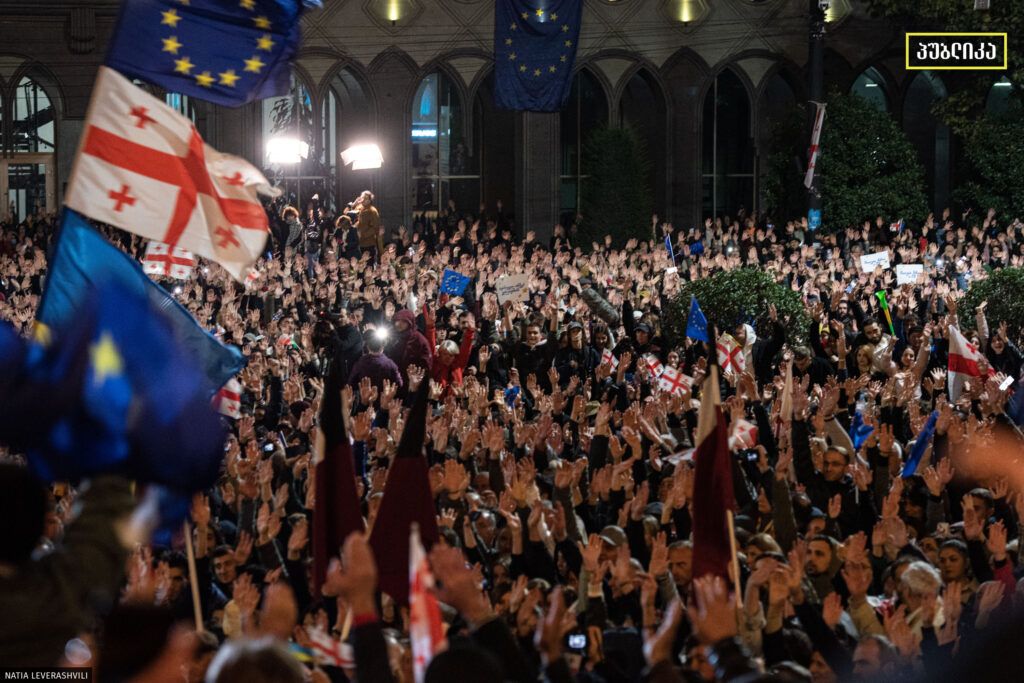
Speaking on stage, the parties that overcame the barriers declared to the public that they do not recognize the election results, will not enter parliament, and demand an investigation and new elections.
November 4
Thousands of people gathered on this day, claiming to protest against election fraud. The protesters marched from the station square towards Rustaveli Avenue, where traffic was blocked as more and more people joined the demonstration. The demonstration, which was marked by the Georgian and European Union flags, began with the national anthems.
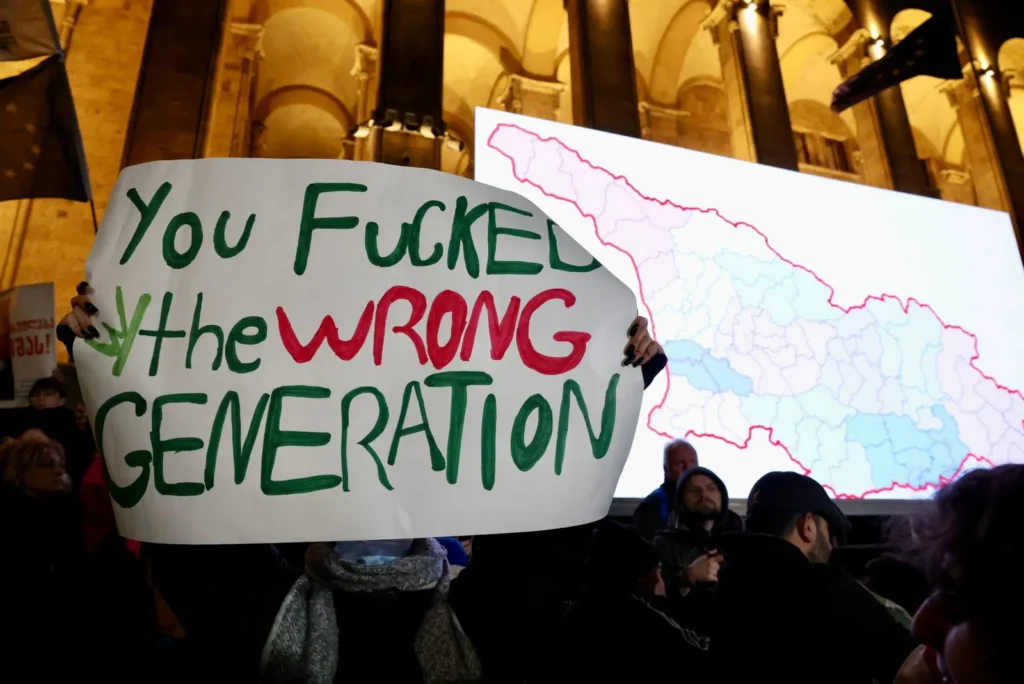
November 10
“We do not recognize the elections” – A protest march was held in Tbilisi from Freedom Square to Baratashvili Bridge. The participants of the rally believed that the parliamentary elections held in the country on October 26 were rigged and therefore demanded that new elections be held.
As the organizers stated, each member of the group created on the social network is the main driving force of the real protest, and it is necessary for the mood in the group to spill over to the streets.
Opposition leaders announced non-stop protests demanding new elections and outlined an action plan: 1) Ensure that all Georgian citizens are informed about the fraud, deceit, and machinations that the Georgian Dream is using to steal the elections; 2) Ensure that international partners do not recognize the fraudulent elections. 3) Continue democratic resistance, civil activism, and street protests.
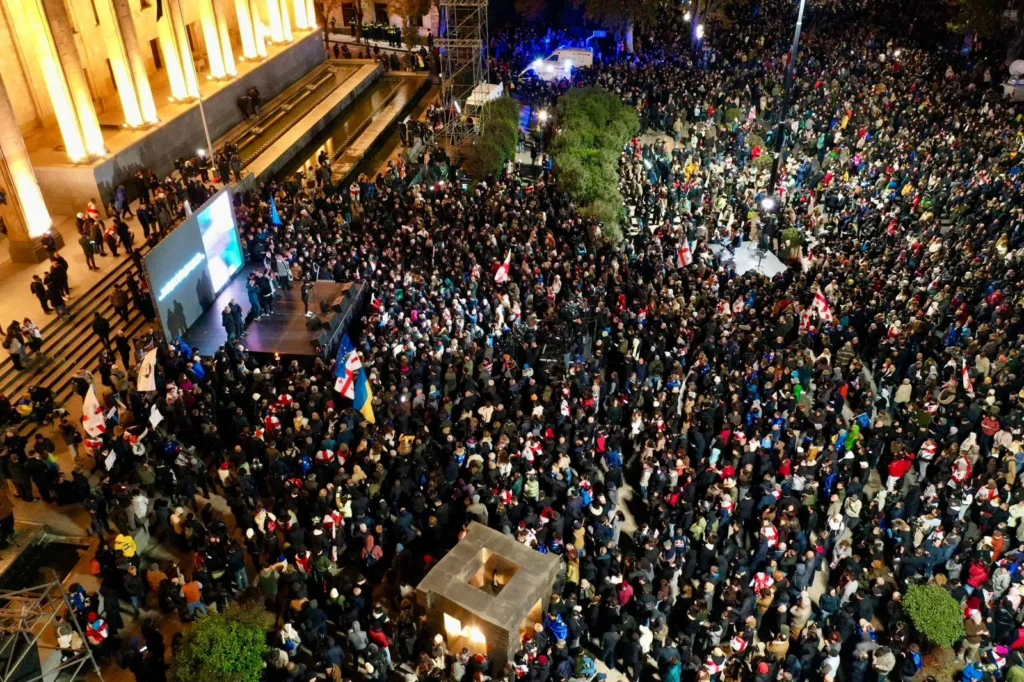
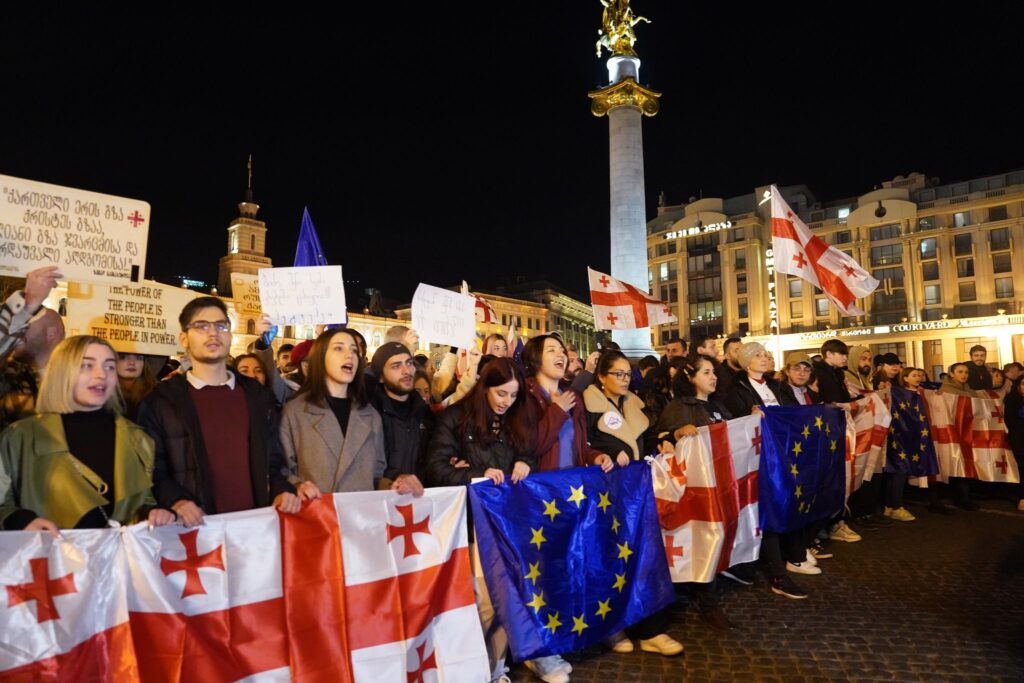
As the organizers stated, each member of the group created on the social network is the main driving force of the real protest, and it is necessary for the mood in the group to spill over to the streets.
November 4
Thousands of people gathered on this day, claiming to protest against election fraud. The protesters marched from the station square to Rustaveli Avenue, where traffic was blocked as more and more people joined the demonstration. The demonstration, which was marked by the Georgian and European Union flags, began with the national anthem.

Opposition leaders announced non-stop protests demanding new elections and outlined an action plan: 1) Ensure that all Georgian citizens are informed about the fraud, deceit, and machinations that the Georgian Dream is using to steal the elections; 2) Ensure that international partners do not recognize the fraudulent elections. 3) Continue democratic resistance, civil activism, and street protests.

November 10
“We do not recognize the elections” – A protest march was held in Tbilisi from Freedom Square to Baratashvili Bridge. The participants of the rally believed that the parliamentary elections held in the country on October 26 were rigged and therefore demanded that new elections be held.

As the organizers stated, each member of the group created on the social network is the main driving force of the real protest, and it is necessary for the mood in the group to spill over to the streets.
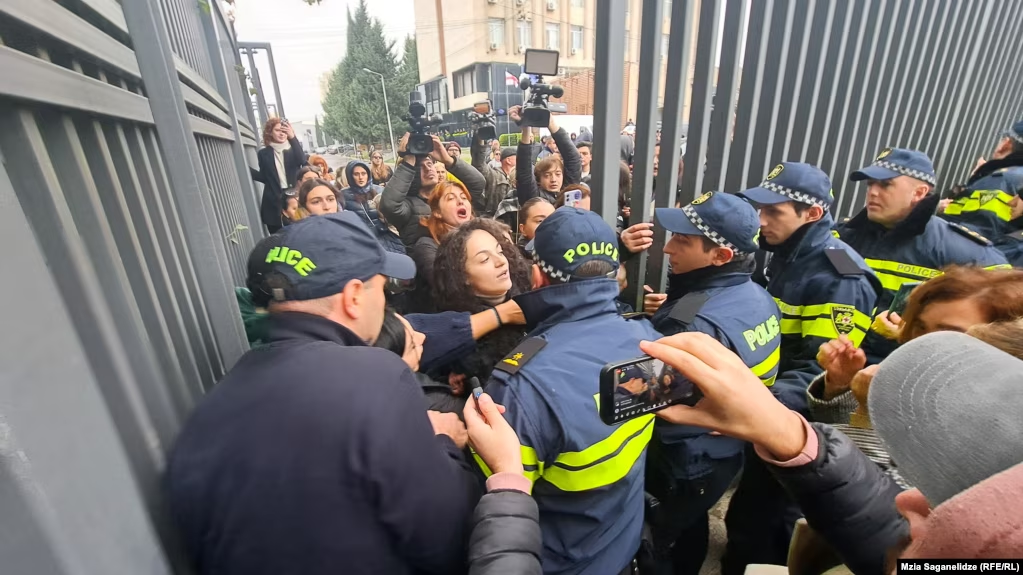
November 13

The women's rally near the Central Election Commission was held amid noise and police mobilization. The women who arrived at the Central Election Commission to hold a rally were met with iron barriers and mobilized police, who did not allow them to enter the yard and building of the election administration. The women wanted to address the CEC with individual complaints.
November 13
The women's rally near the Central Election Commission was held amid noise and police mobilization. The women who arrived at the Central Election Commission to hold a rally were met with iron barriers and mobilized police, who did not allow them to enter the yard and building of the election administration. The women wanted to address the CEC with individual complaints.
With these complaints, they requested the annulment of the elections that had already been held and the holding of new elections, as they believe that the right to secrecy of the vote was not a guaranteed right of voters on October 26.
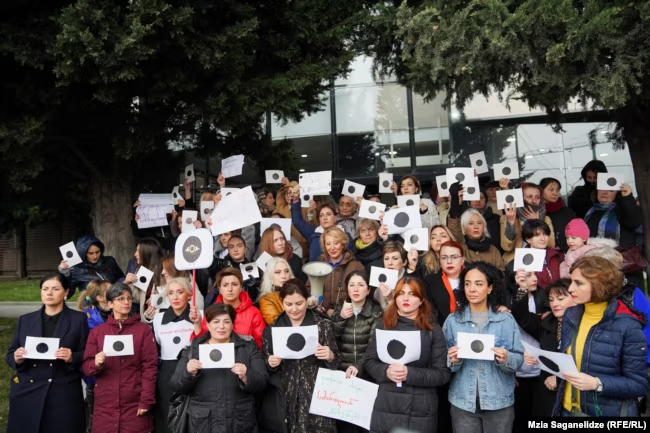

With these complaints, they demanded the annulment of the elections that had already been held and the holding of new elections, because they believe that the right to secrecy of the vote was not a guaranteed right of voters on October 26. Shalva Papuashvili ordered Levan Khabeishvili, Giorgi Vashadze, Tina Bokuchava and Ana Natsvlishvili to leave the session. Other opposition MPs also left the hall. Citizens gathered in front of the parliament during the discussion.
November 15
Citizens gathered at Republic Square and held a protest march in connection with the results of the parliamentary elections. The march was organized by the group "Leave", which also organized the protest march last week. "The protest continues! Together we have already proven that we can peacefully create a center of resistance," the organizers said.
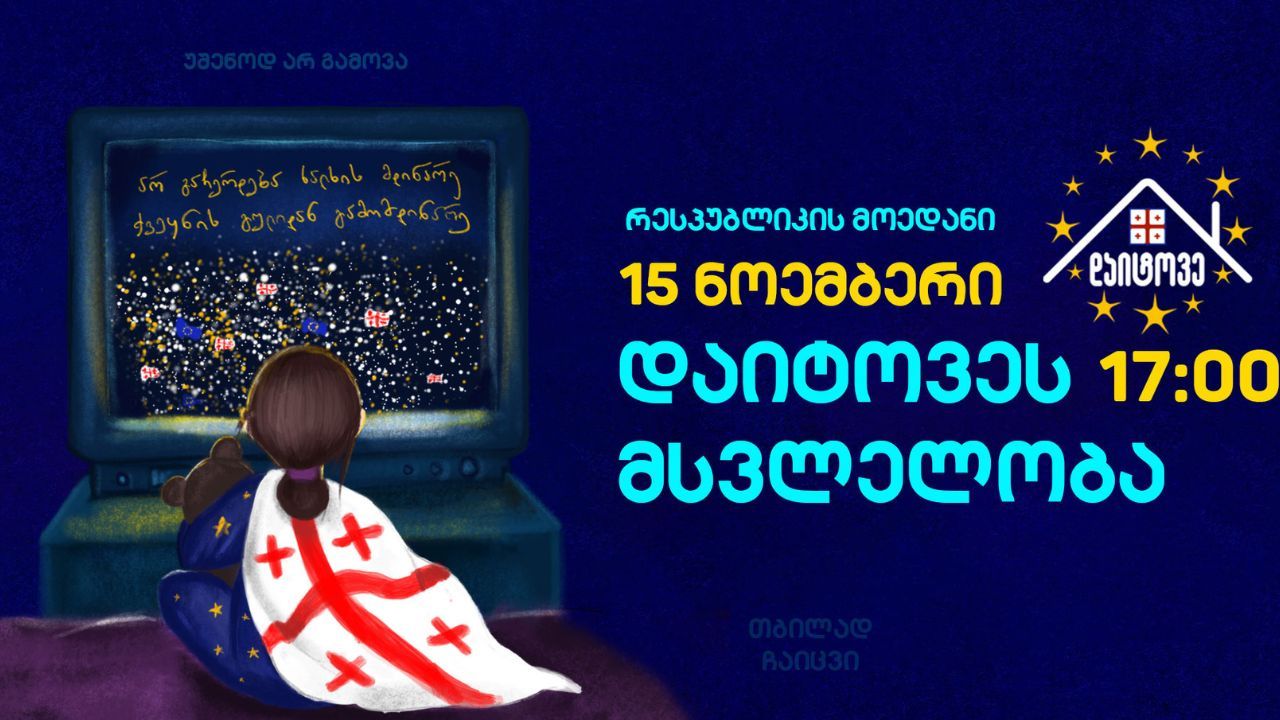
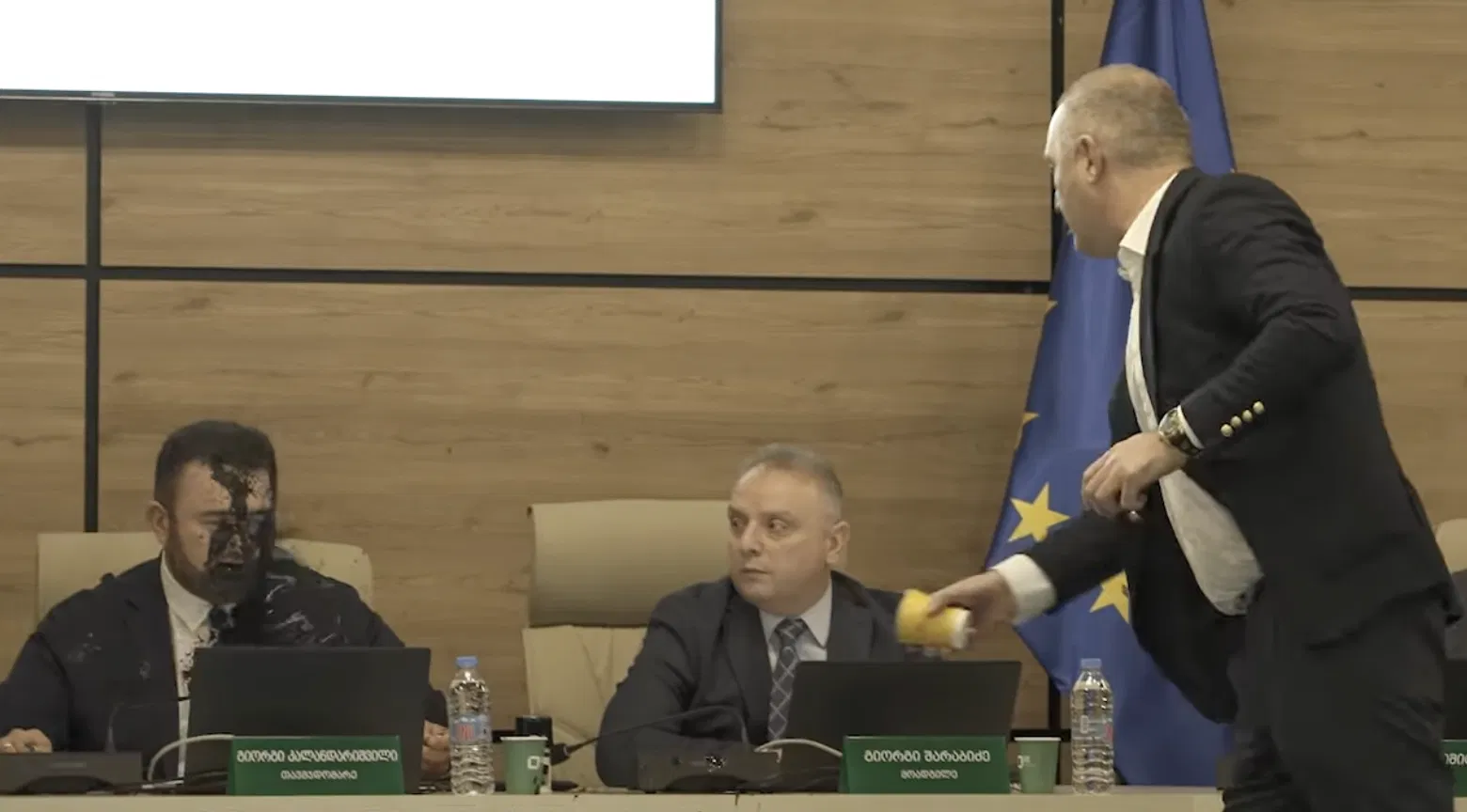
November 16
The Central Election Commission of Georgia (CEC) has published the final summary protocol of the October 26 parliamentary elections, according to which the Georgian Dream party won the elections with almost 54% of the vote. However, with the opposition and observers calling the elections fraudulent, the CEC session was marred by fights, and citizens held a protest rally in front of the building.

Shortly after the meeting began, Davit Kirtadze, a representative of the opposition United National Movement in the Central Election Commission, confronted the CEC Chairman, Giorgi Kalandarishvili, calling him a “black spot” and throwing black paint on his face. This action was related to the violation of the secrecy of voting in the elections, in particular, the issue of thin paper ballots, on which it was clearly visible who the voter had voted for.
Shortly after the meeting began, Davit Kirtadze, a representative of the opposition United National Movement in the Central Election Commission, confronted the CEC Chairman, Giorgi Kalandarishvili, calling him a “black spot” and throwing black paint on his face. This action was related to the violation of the secrecy of voting in the elections, in particular, the issue of thin paper ballots, on which it was clearly visible who the voter had voted for.
November 17
A protest rally was held in Tbilisi on Chavchavadze Avenue, organized by the opposition political party, demanding new elections. The rally began at 8 p.m., with demonstrators initially setting up three large tents, and by midnight, they had added about 20 smaller tents. Chavchavadze Avenue, Varaziskhevi, Melikishvili Avenue, and Kekelidze Street were blocked.
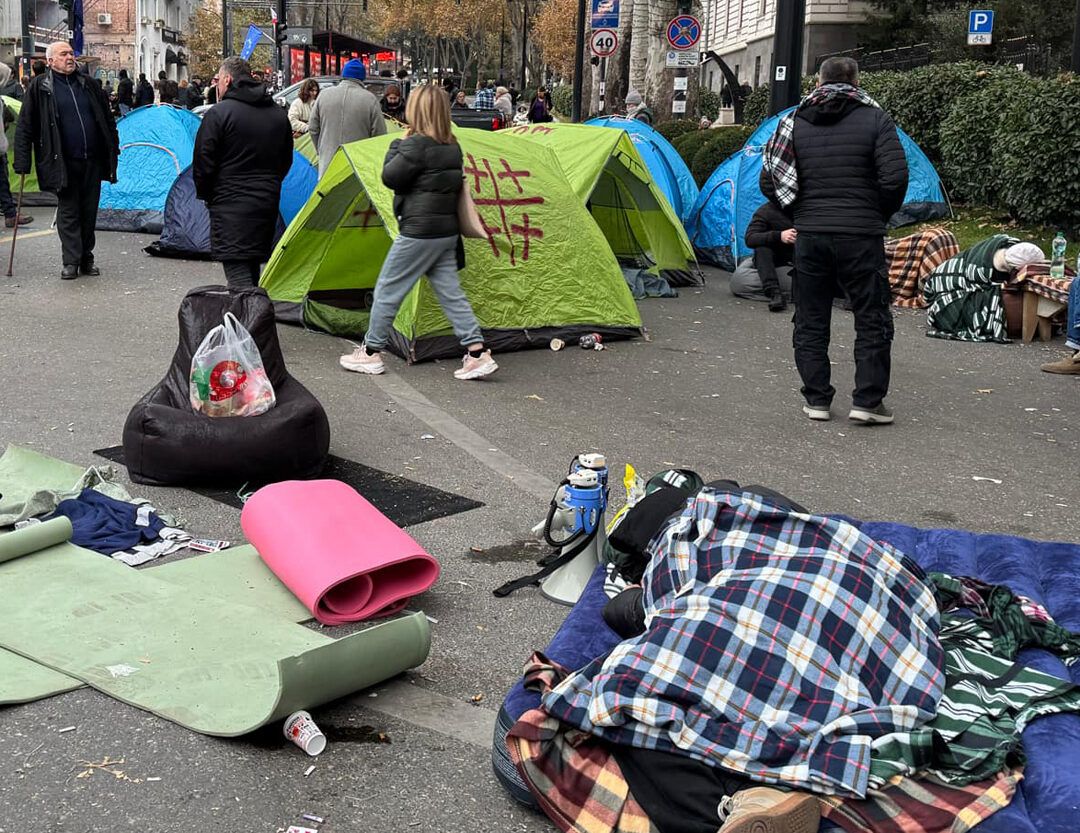
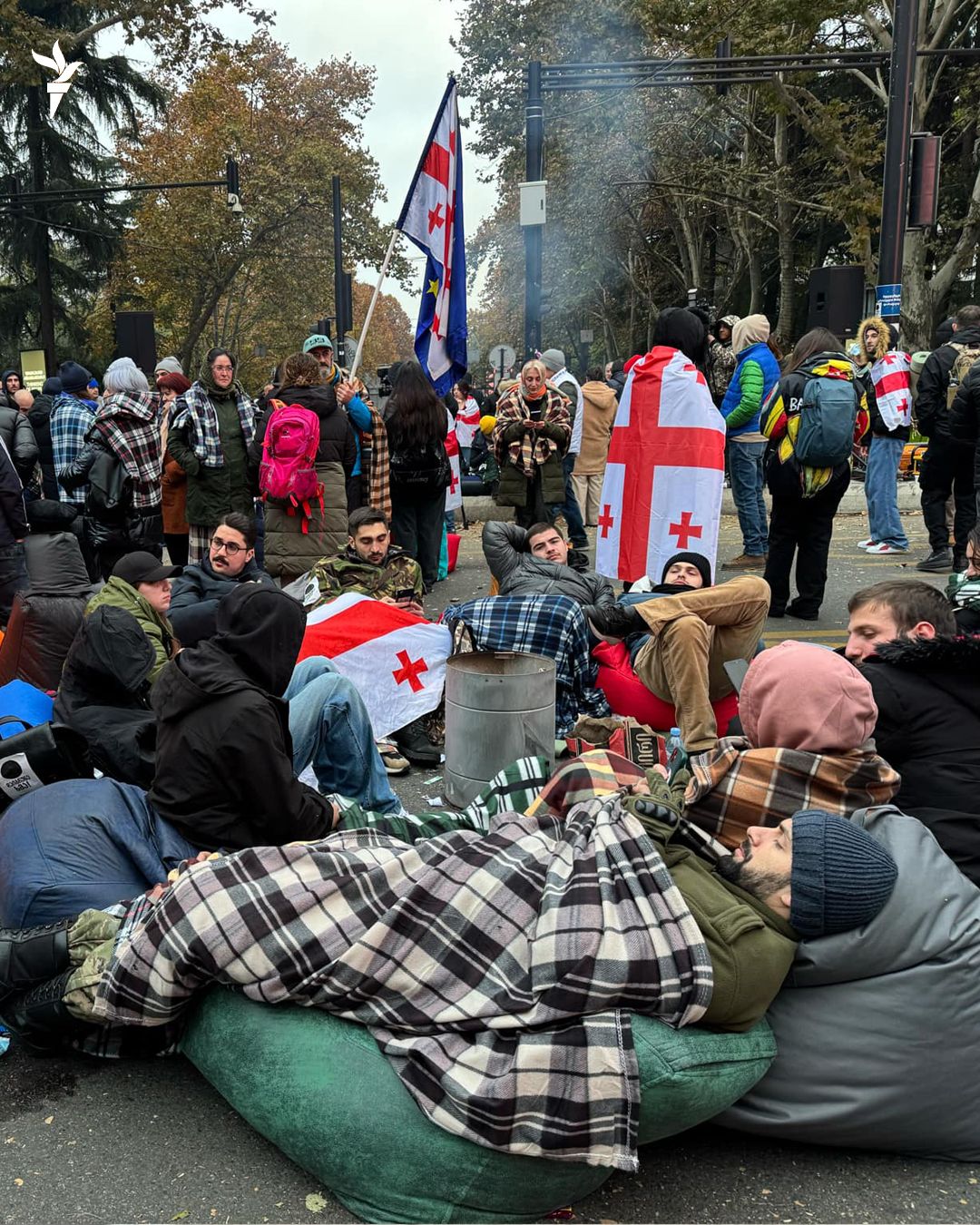
November 19
During the protest, after the police occupied the area surrounding Tbilisi State University and the demonstrators moved to Melikishvili Avenue, the police physically assaulted the protest participants and media representatives. They beat up Public journalist Mindia Gabadze.
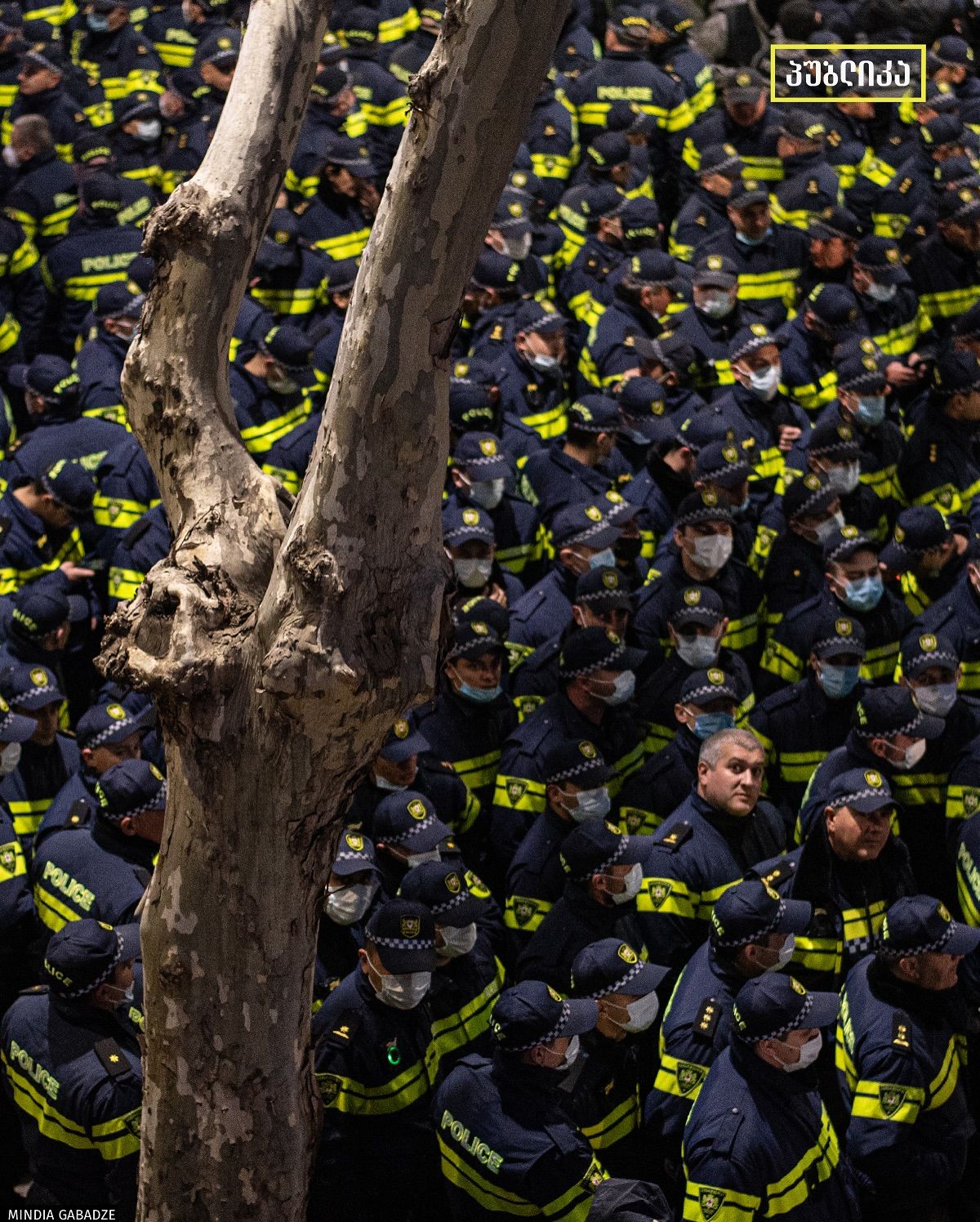
In addition, the operator of the “Main Channel” was physically assaulted and then arrested. He has bruises around his eye and lip. According to the Ministry of Internal Affairs, the agency arrested 16 people. Police forces forcibly occupied the place where peaceful protest participants had been located for two days. A large number of police and special forces appeared on the scene after approximately 06:00 in the morning.
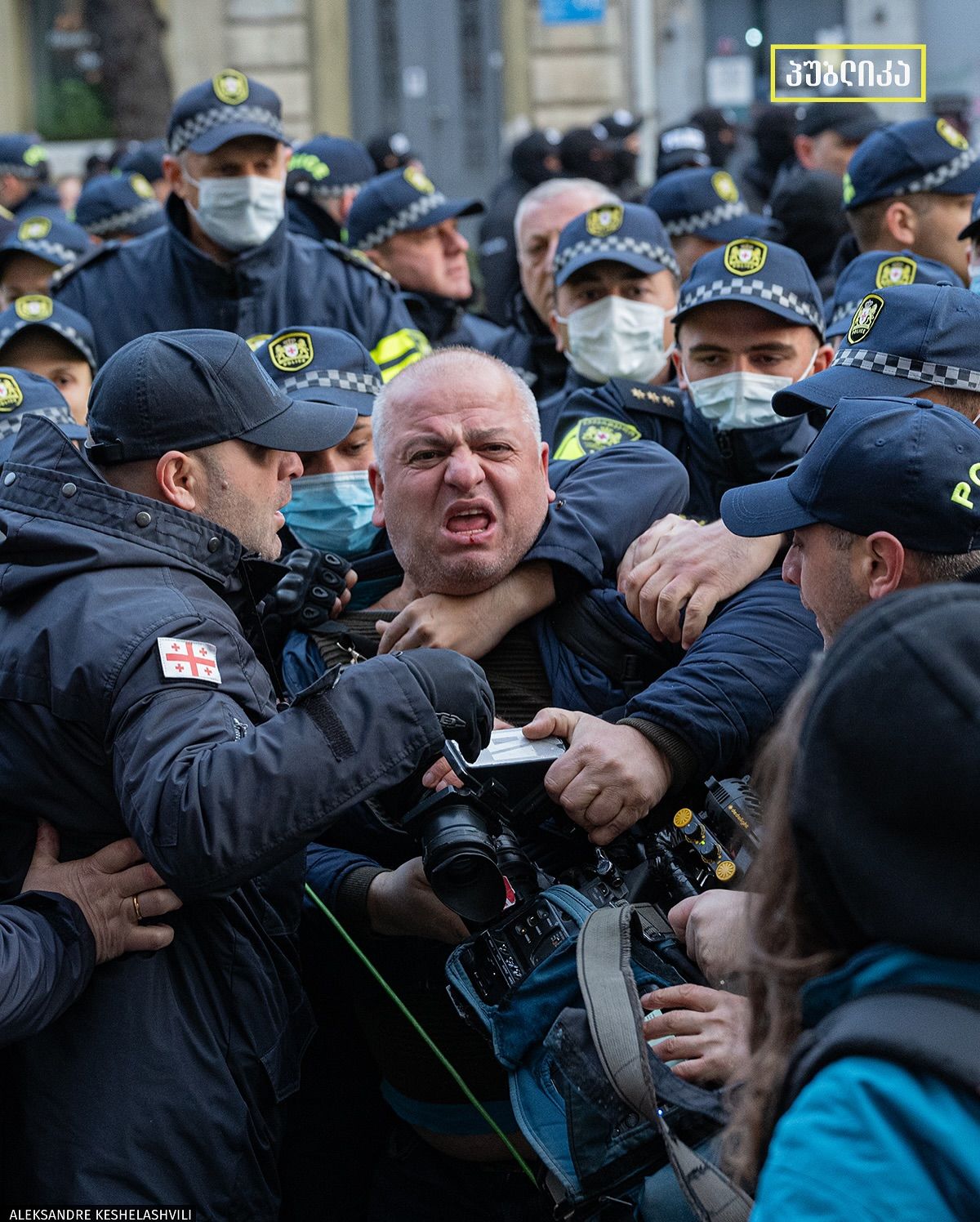
They had mobilized special equipment, including water cannons. Law enforcement officers cleared the area of protesters and removed their vehicles, tents, and other equipment.
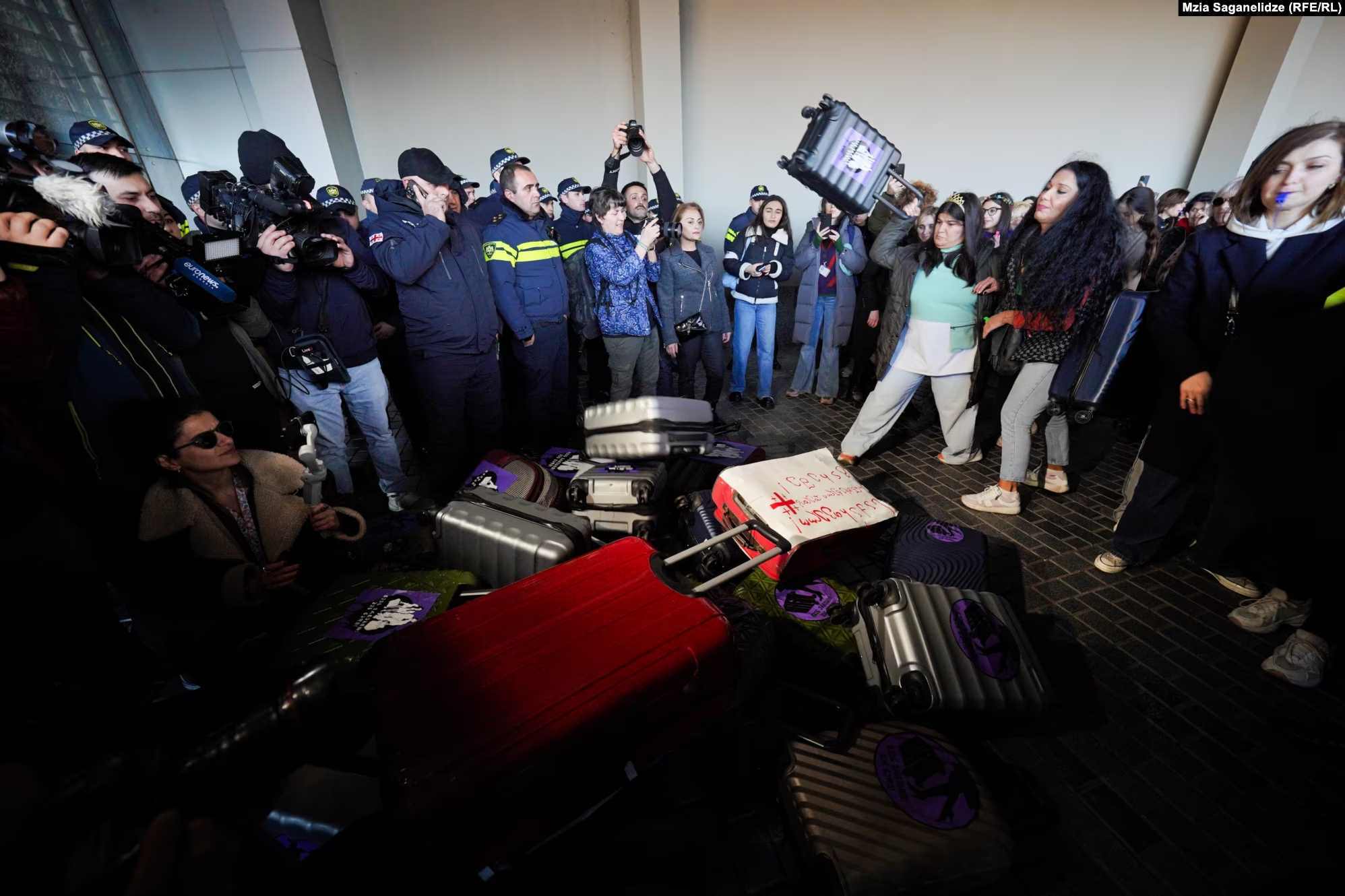
November 24
Several events were held on this day, including a march of students and professors, a march of cultural figures, and a women's march and performance.

A march and performance titled "Bidzina Go, We Stay" was held on November 24, the International Day for the Elimination of Violence against Women, during which activists and politicians marched with suitcases from Freedom Square to the business center of Bidzina Ivanishvili, the founder and honorary chairman of the Georgian Dream.
November 25
Citizens who spent the entire night outside the parliament in protest remained in front of the legislative building. Police, including riot police, were mobilized near the building. 88 out of 89 Georgian Dream MPs were present in the parliament, while opposition parties did not enter the parliament because they do not recognize its legitimacy.
Ambassadors were not invited to the first session. Within an hour, the parliament recognized the credentials of all 150 deputies. President Salome Zurabishvili, who does not recognize the elections, refused to convene the first session of parliament, although the majority of the Georgian Dream decided to hold the first session anyway.
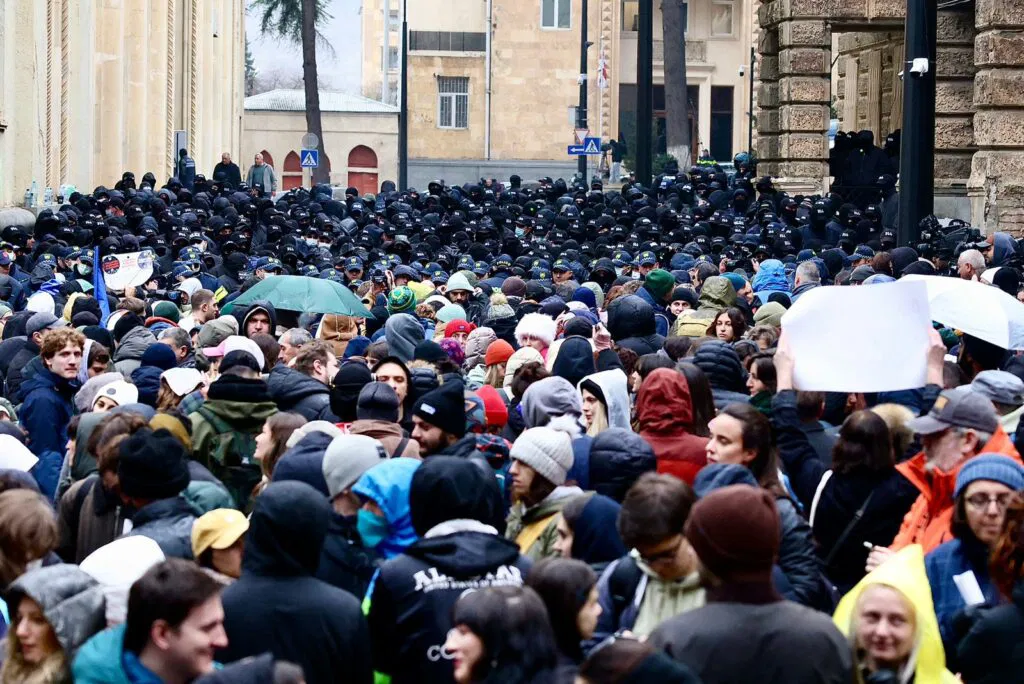
Ambassadors were not invited to the first session. Within an hour, the parliament recognized the credentials of all 150 deputies. President Salome Zurabishvili, who does not recognize the elections, refused to convene the first session of parliament, although the majority of the Georgian Dream decided to hold the first session anyway.
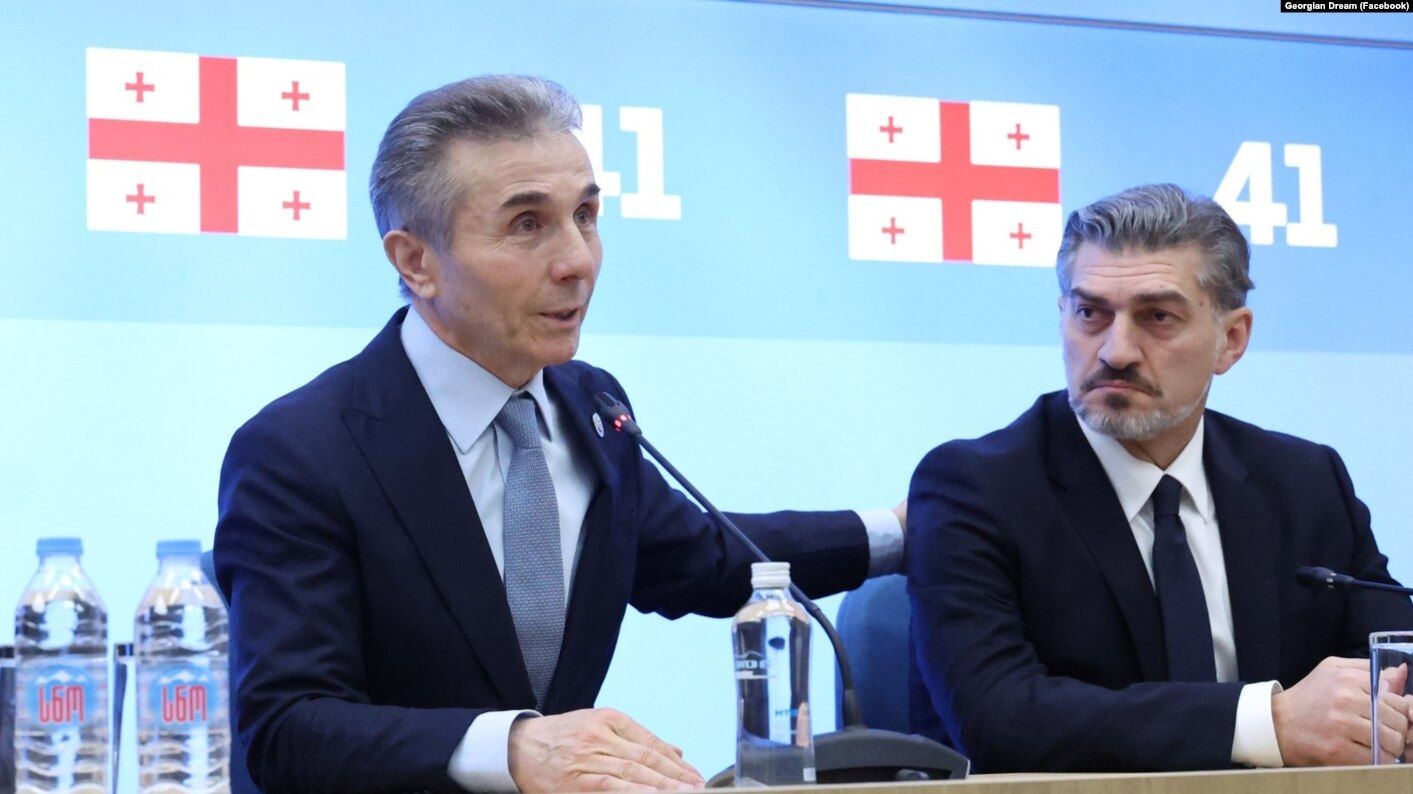
November 27

Georgian Dream has nominated Mikheil Kavelashvili as its presidential candidate. Before entering politics, Mikheil Kavelashvili was a football player. He does not have a higher education diploma, which is why he was unable to participate in the elections for the president of the Football Federation.
Chapter VI: Suspension of integration with the European Union and continuous actions
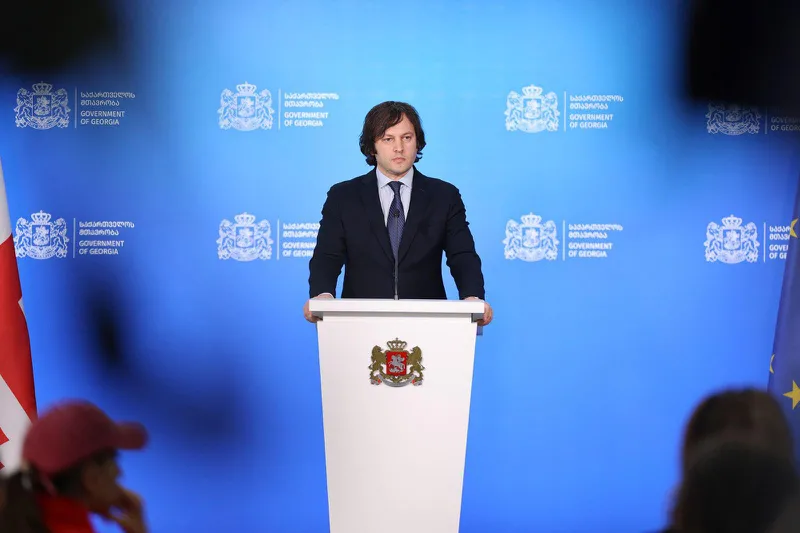
November 28, 2024
The Georgian government refuses to open negotiations with the European Union until the end of 2028. This was announced by Georgian Prime Minister Irakli Kobakhidze at the office of the Georgian Dream party. "Today we have decided not to put the issue of opening negotiations with the European Union on the agenda until the end of 2028. Also, we refuse any budget grant from the European Union until the end of 2028."

Within an hour of the announcement, citizens blocked Rustaveli Avenue. From 2 a.m., after periodic clashes between police and demonstrators near the Georgian Parliament, the Ministry of Internal Affairs began to disperse the rally and arrest participants.
Within an hour of the announcement, citizens blocked Rustaveli Avenue. From 2 a.m., after periodic clashes between police and demonstrators near the Georgian Parliament, the Ministry of Internal Affairs began to disperse the rally and arrest participants.
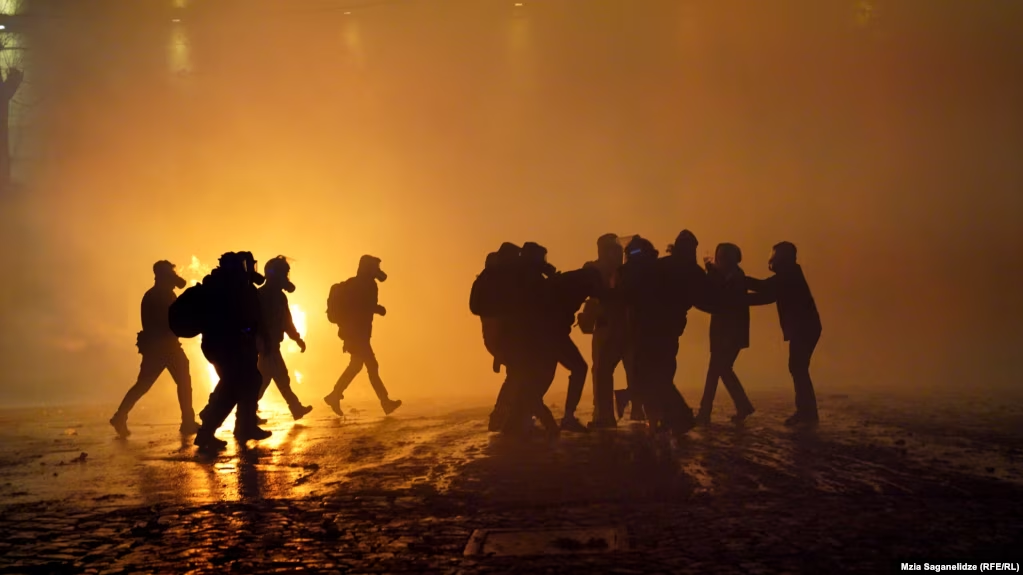

November 29, 2024
The second night of protests ended with physical violence against demonstrators by the police and the arrest of dozens of protest participants.
November 30, 2024
Police forces surrounded the demonstrators
December 1
How the public "acquired" 40 minutes of Georgian Public Broadcasting airtime
Protests in front of the Public Broadcasting building have been going on since November 30, and for the third day now, the police have been using water cannons, tear gas, and pepper spray to disperse tens of thousands of demonstrators gathered in front of the parliament. They are detaining and severely beating demonstrators, and are assaulting journalists.
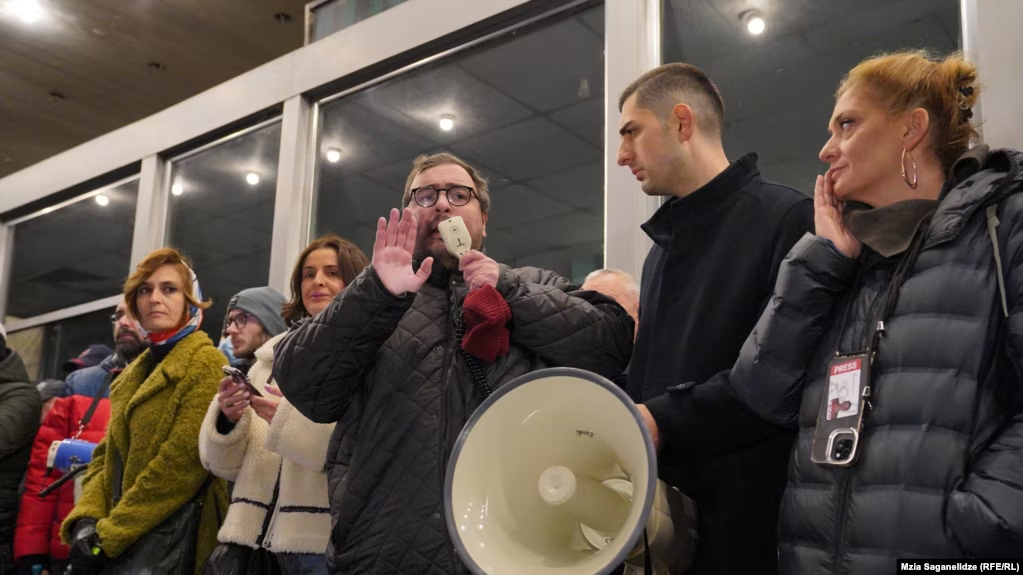
The people who came to the Public Broadcaster accused Channel One of hiding the truth and biased coverage and demanded live broadcast. After several hours of negotiations between the protest participants and the management of the Public Broadcaster, the airwaves were given to the people gathered at Channel One. After difficult and multi-stage negotiations, the Public Broadcaster finally began broadcasting daily from December 8, which the demonstrators call “gained airwaves.”
Searches were conducted in violation of the law, opposition leaders and leaders of activist groups were detained with excessive force, including: activist Dodo Kharkheli and politician Nika Gvaramia were arrested, and the homes of the administrators of the group "Leave" - Nancy Voland and Ilia Glonti - were searched.
According to the Ministry of Internal Affairs, the agency was conducting an investigation under Articles 225 and 239 of the Criminal Code, which include leading or participating in the organization of group violence and public incitement to violent acts.
According to the Ministry of Internal Affairs, 7 people were arrested within the framework of this investigation, and searches were conducted at the homes and residences of 6 people. Based on the judge's ruling, investigative actions were carried out at the offices of the "Stubborn" movement, the "Droasa" party, and the "Girchi" party, as well as at the youth office of the "United National Movement" party.
December 3
Repression begins
December 3 - Repression begins - Against the backdrop of continuous protests in about 40 cities of Georgia, with more than 100,000 people gathering every day in Tbilisi alone to demand the end of the "Georgian Dream" regime, civil servants, universities, teachers and students going on strike, the ruling party began massive repression. People fighting the system were questioned at home by the police.
December 3
Repression begins
December 3 - Repression begins - Against the backdrop of continuous protests in about 40 cities of Georgia, with more than 100,000 people gathering every day in Tbilisi alone to demand the end of the "Georgian Dream" regime, civil servants, universities, teachers and students going on strike, the ruling party began massive repression. People fighting the system were questioned at home by the police.
Searches were conducted in violation of the law, opposition leaders and leaders of activist groups were detained with excessive force, including: activist Dodo Kharkhel and politician Nika Gvaramia were arrested, and the homes of the administrators of the group "Leave" - Nancy Woland and Ilia Glonti - were searched.
According to the Ministry of Internal Affairs, the agency was conducting an investigation under Articles 225 and 239 of the Criminal Code, which include leading or participating in the organization of group violence and public incitement to violent acts.
According to the Ministry of Internal Affairs, 7 people were arrested within the framework of this investigation, and searches were conducted at the homes and residences of 6 people. Based on the judge's ruling, investigative actions were carried out at the offices of the "Stubborn" movement, the "Droasa" party, and the "Girchi" party, as well as at the youth office of the "United National Movement" party.
December 7
On Besiki Street, a TV Pirveli camera crew was physically assaulted by unknown individuals dressed in black. The attack took place live on air. Giorgi Shetsiruli, a TV Pirveli cameraman, had his head broken. Journalist Maka Chikhladze suffered injuries to her face and various parts of her body. According to the journalist, there were also police on the scene, but they left the area after the attack.
December 8
By 4:00 AM, the installation of a New Year's tree in front of the parliament building in Tbilisi began. As a sign of protest, the demonstrators displayed photos of protest participants, journalists, and cameramen beaten by police officers on the New Year's tree.
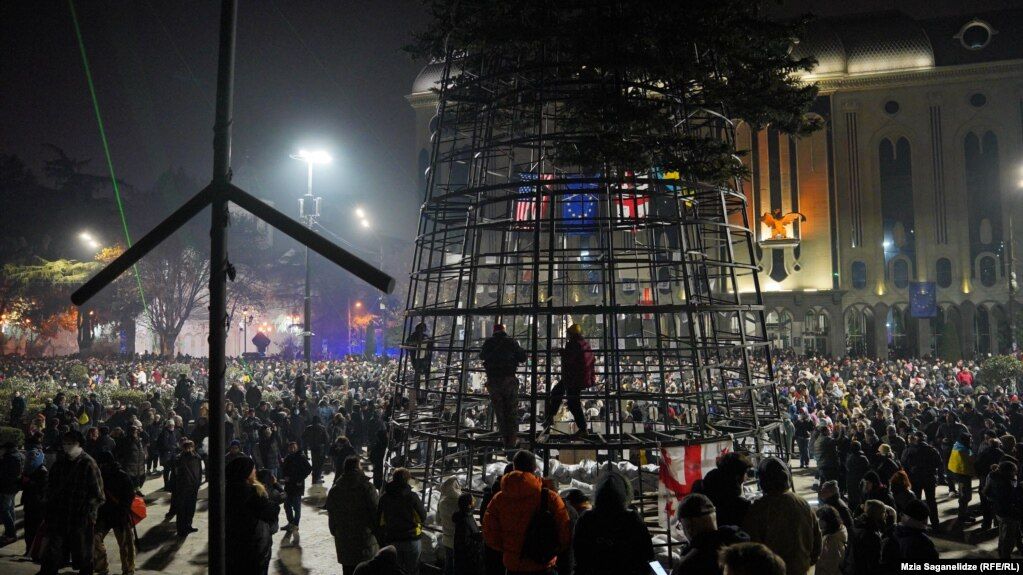
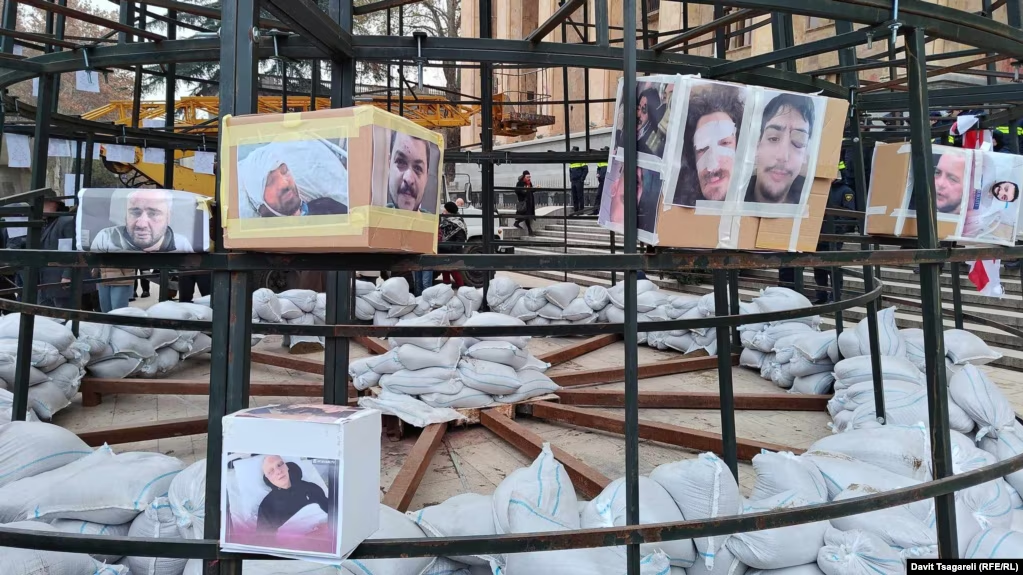
December 12
A seven-member delegation of European Parliamentarians arrived at the protest demonstration on Rustaveli Avenue. Before that, they met with President Salome Zurabishvili, representatives of opposition parties, NGOs and media outlets.
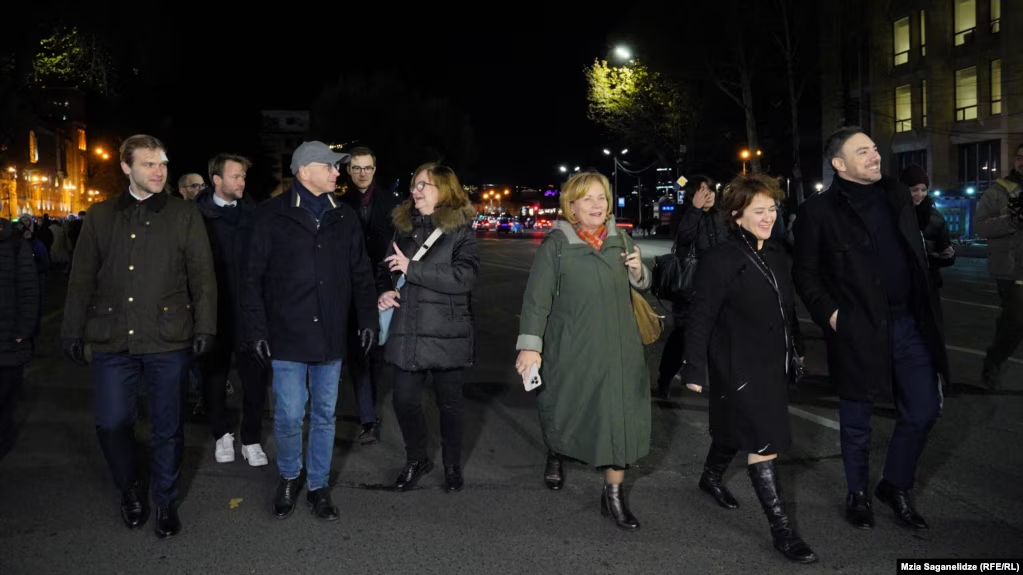
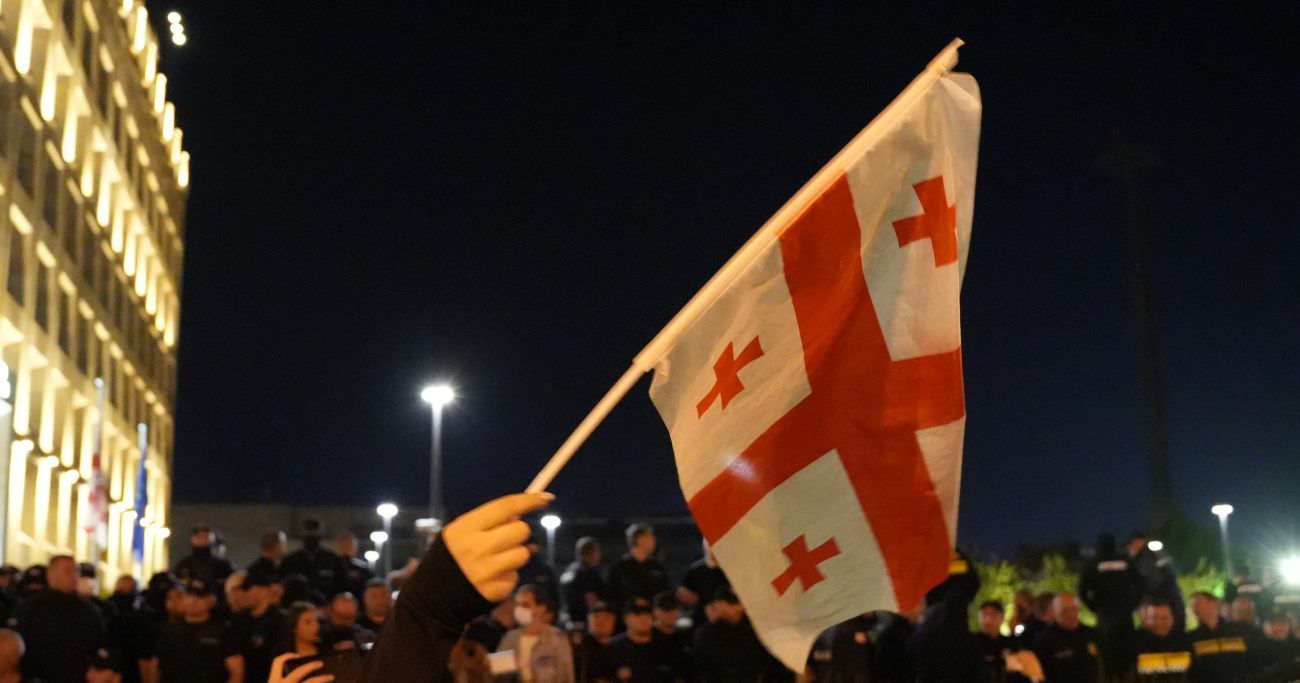
On the same day, the fine for violating several norms of gatherings and demonstrations increases from 500 to 5,000 GEL, and in the case of organizers from 5,000 to 15,000 GEL. The amendment is included in the Code of Administrative Offenses, which the one-party parliament adopted in an expedited manner, with two hearings.
December 13
The “Get Out” protest - at 1:00 PM, roads in several districts of the capital were blocked for almost an hour. Chavchavadze Avenue in Vake, Kazbegi Avenue and Shartava Street in Saburtalo, and Kostava and Rustaveli Avenues in Vera were blocked for almost an hour.

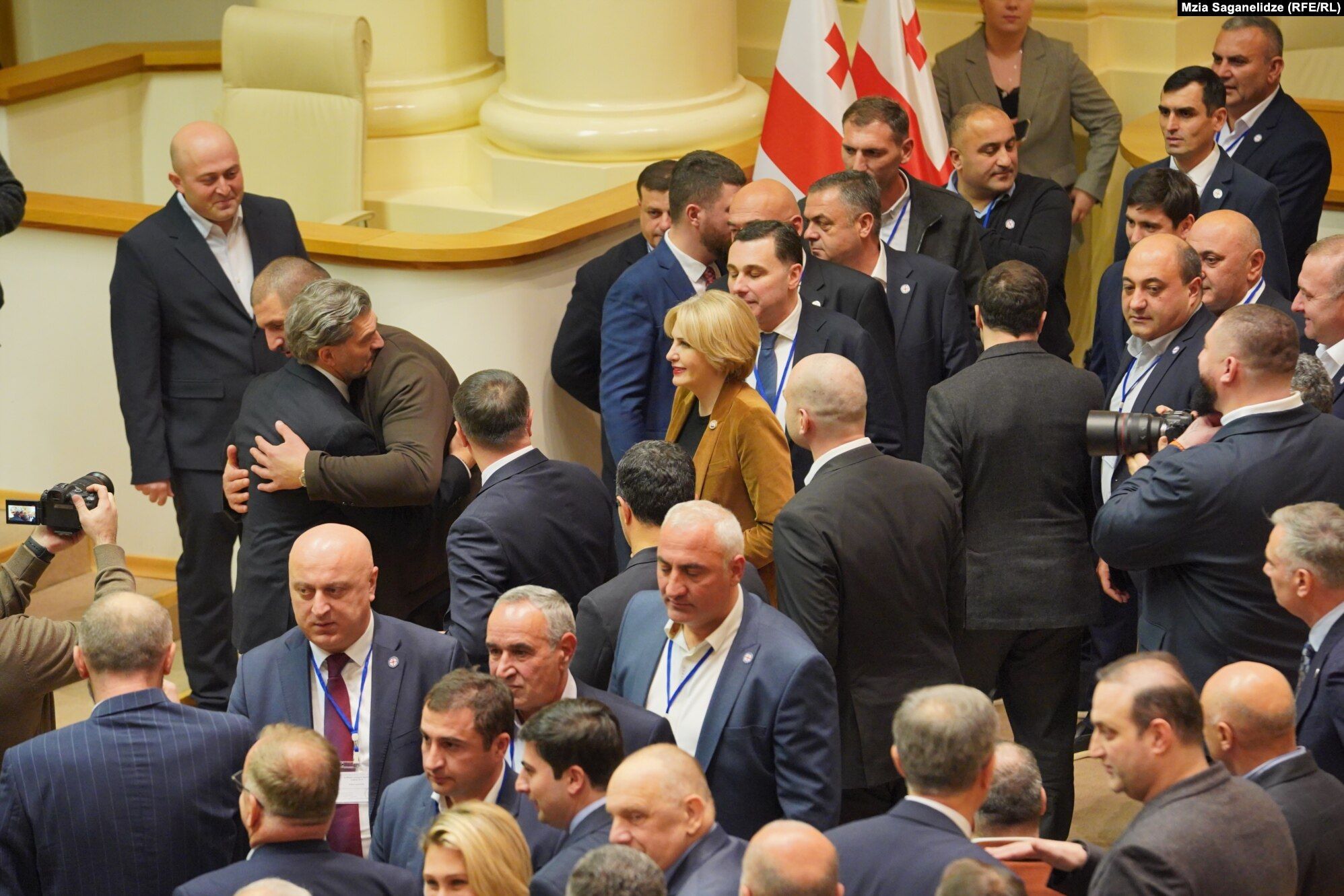
December 14
In the first indirect presidential election in Georgia's history (the legitimacy of which is not recognized by the incumbent president, the opposition, and the pro-European public), the Georgian Dream electoral college nominated the only candidate, former football player and non-degree holder Mikheil Kavelashvili.
Citizens protested the presidential elections outside the parliament building. They first showed Mikheil Kavelashvili their diplomas, then their red cards.
Citizens protested the presidential elections outside the parliament building. They first showed Mikheil Kavelashvili their diplomas, then their red cards.
December 14
The Mayor of Tbilisi was supposed to light the Christmas tree in front of the Parliament at 7 p.m. The tree was first fenced off at dawn, a stage was prepared for the ceremonial opening, and police were stationed around it, but the participants of the pro-European rally still arrived at the protest site on the 17th day, and the ceremonial lighting of the Christmas tree was postponed.
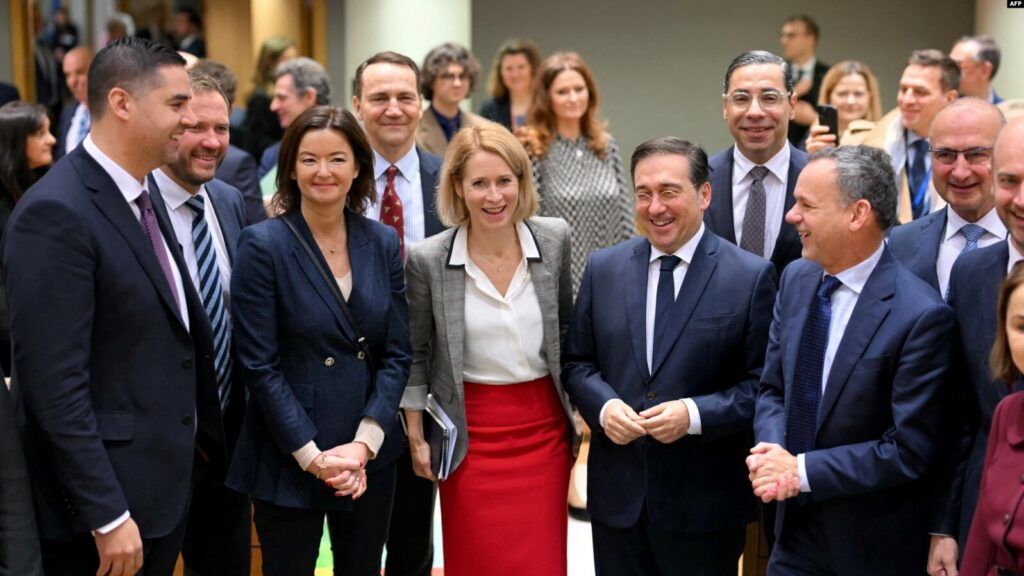
December 16
EU foreign ministers have imposed sanctions on holders of diplomatic and service passports and suspended visa-free travel to Europe. Personal sanctions have been imposed on Bidzina Ivanishvili, as well as the leadership and ministers of the Georgian Dream party, by Lithuania, Latvia, Estonia and Ukraine.

December 21
More than 20 marches were held on this day. The dancers gathered near the Philharmonic Hall and marched to the Opera House in a Khorum line. They held a banner with the inscription “Towards Europe with Khorum.” The dancers at the Opera House began to dance the Khorum and marched towards the Parliament, joined by citizens.
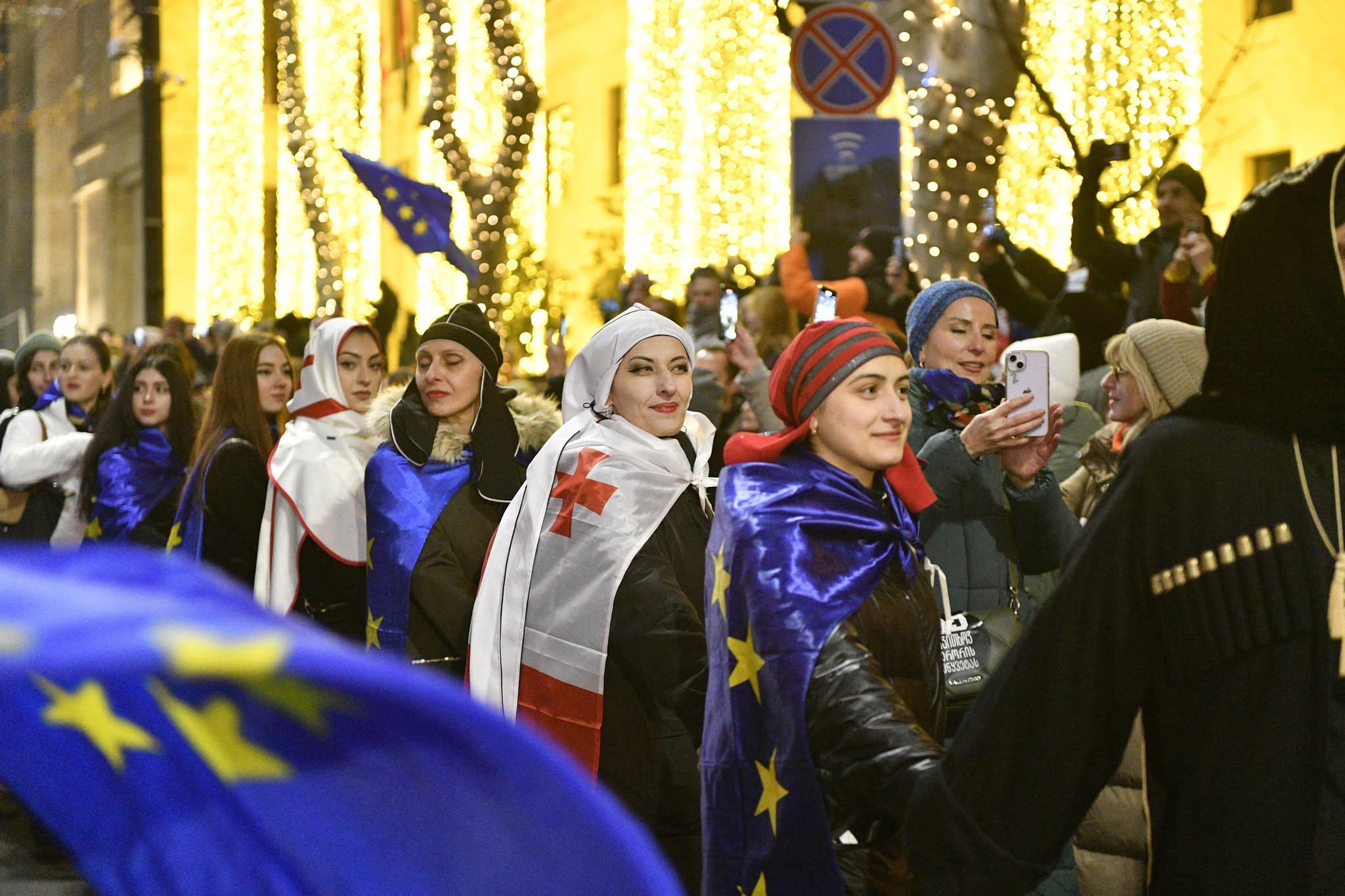
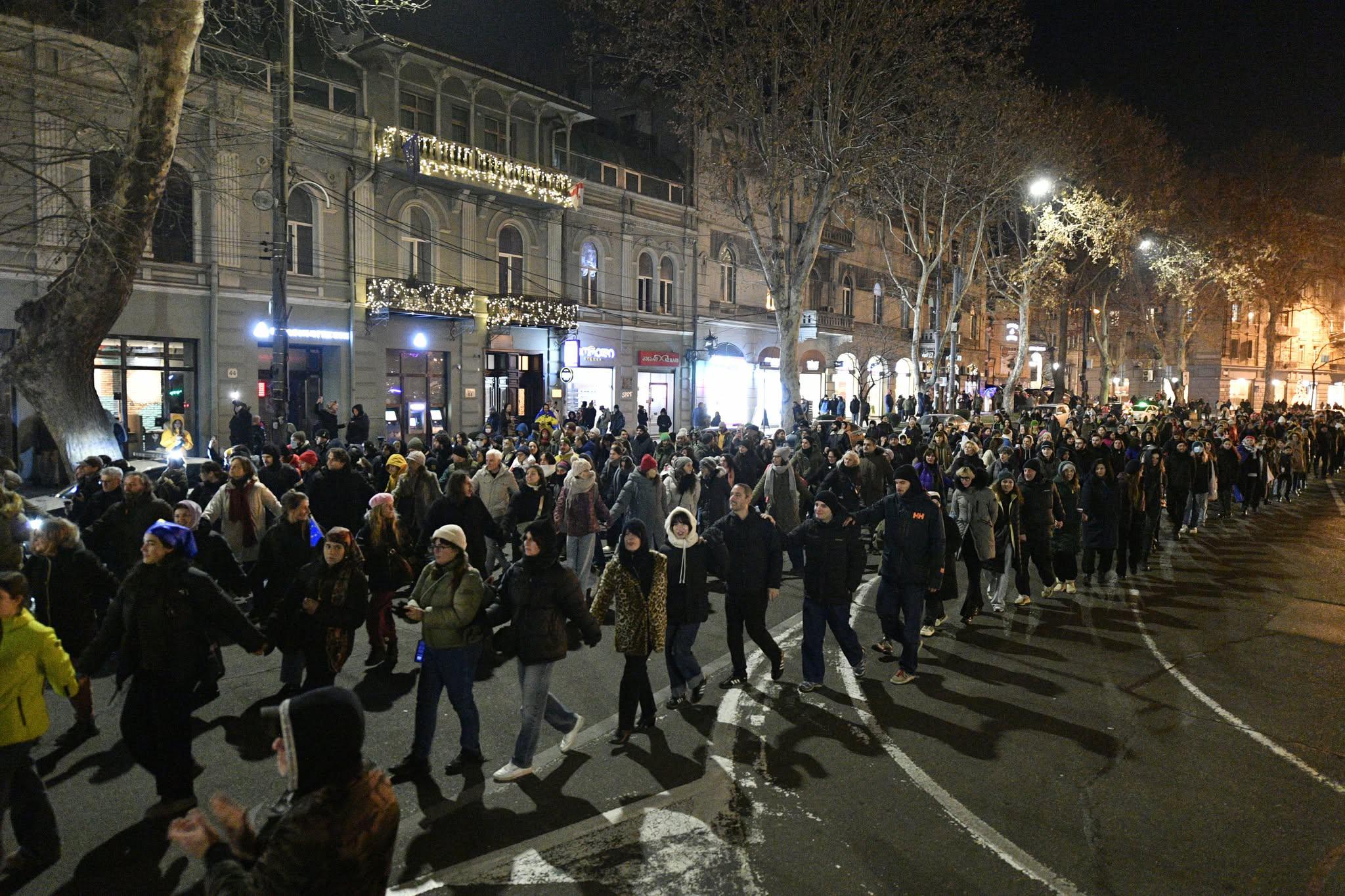
Throughout the day, citizens - from Kutaisi, Adjara, Rachvi, Megrelians, and Svans - gathered at various locations. They eventually gathered in processions near the parliament.
March of the Mingrelians
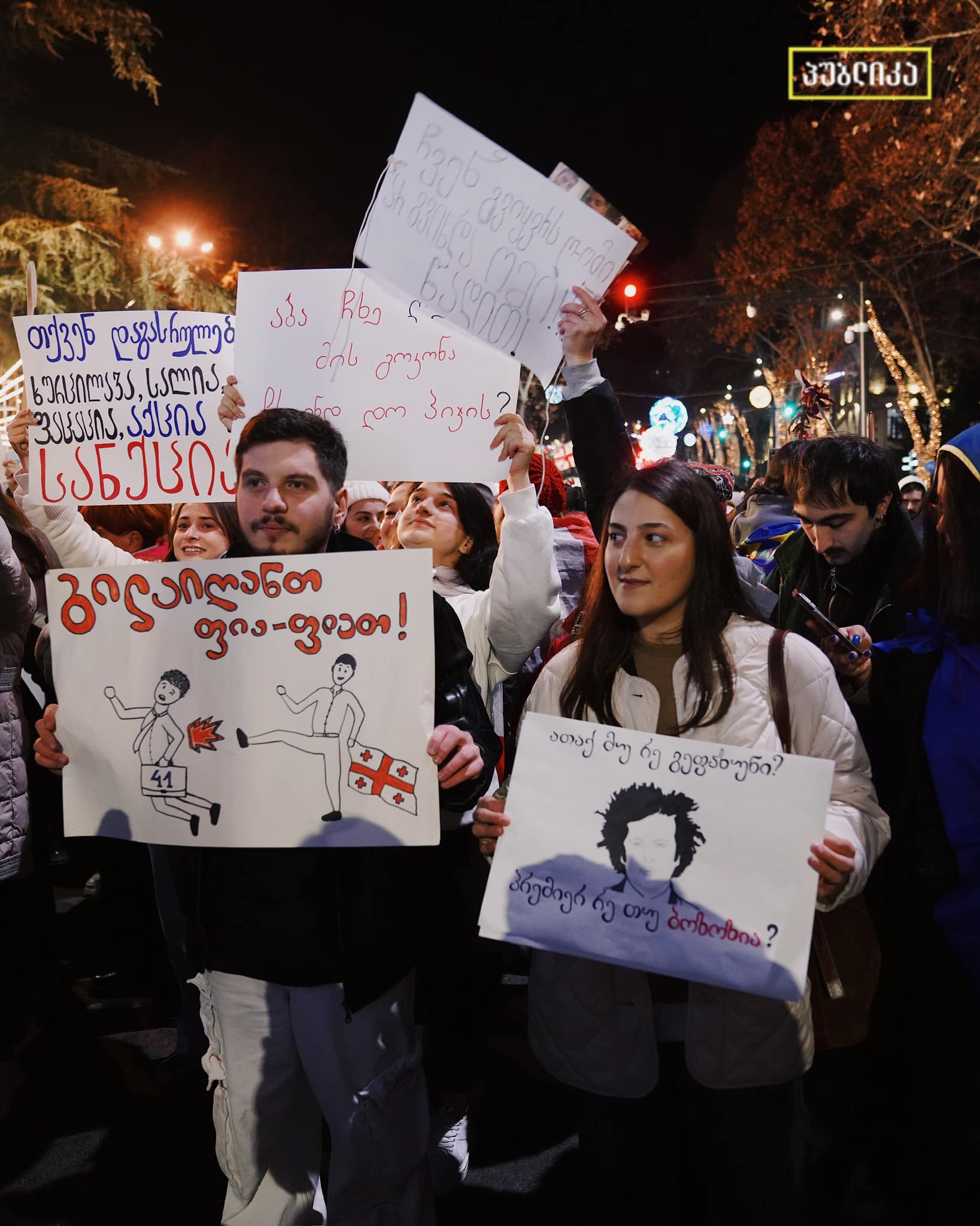
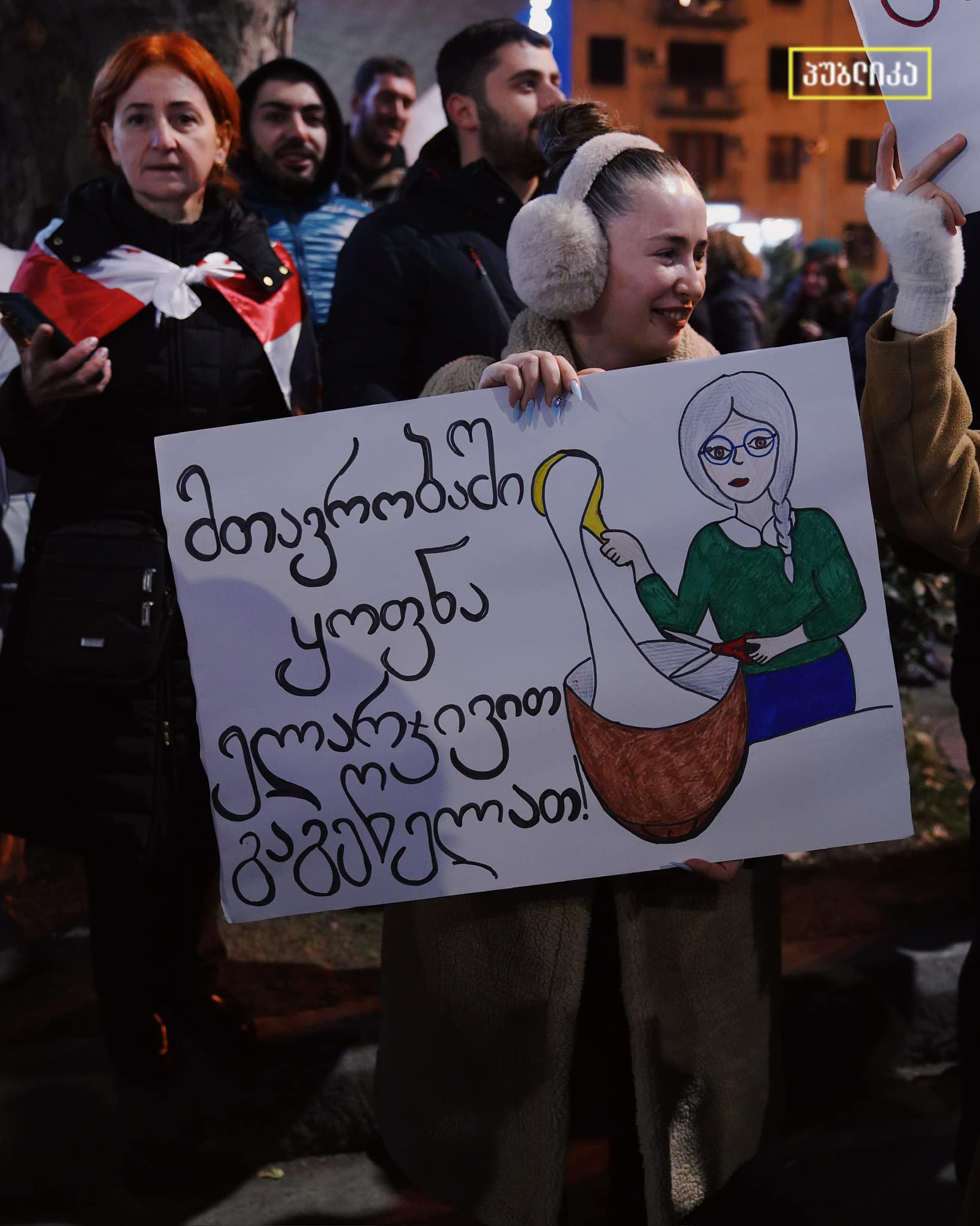
March of the Immortals
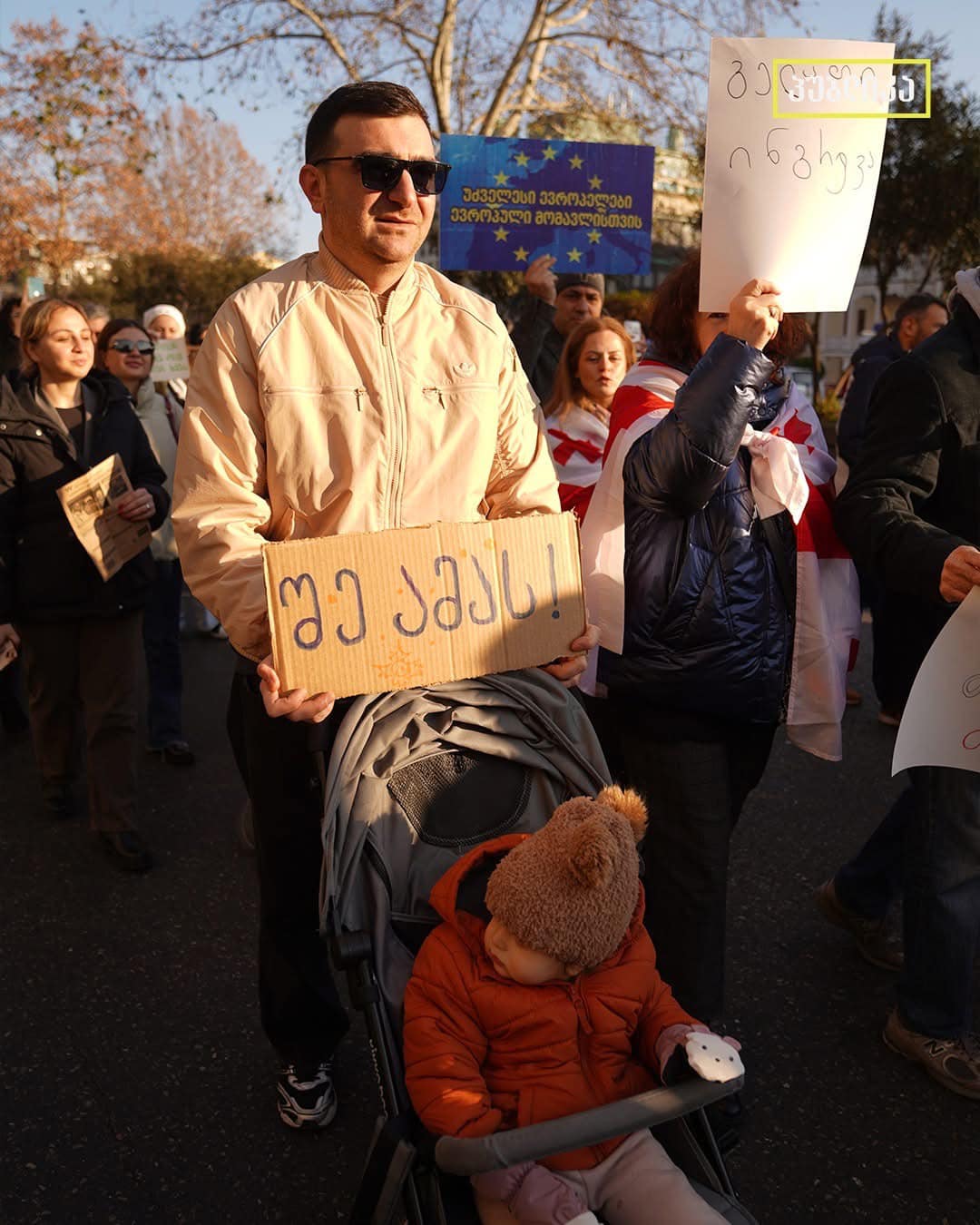
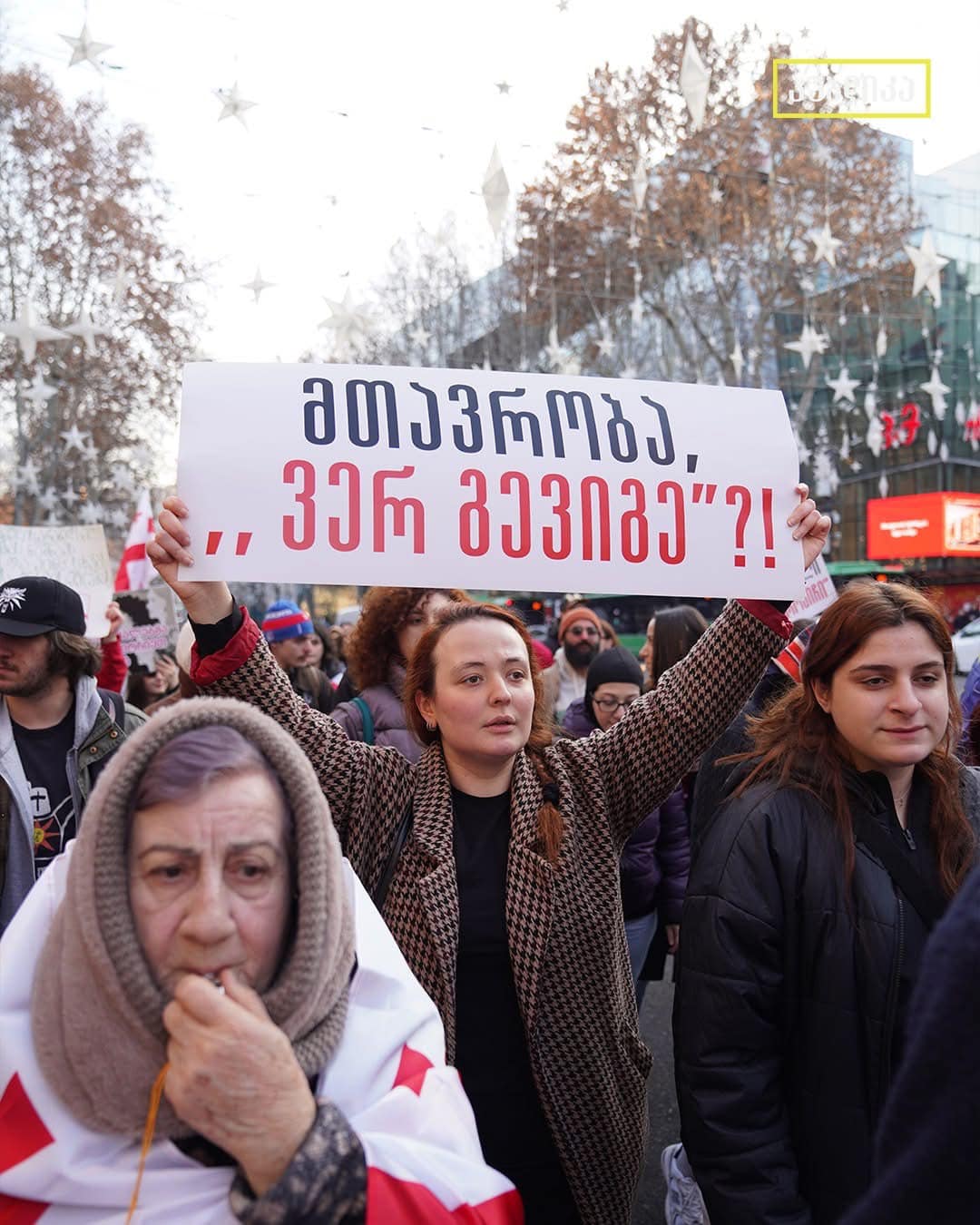
March of the Svans
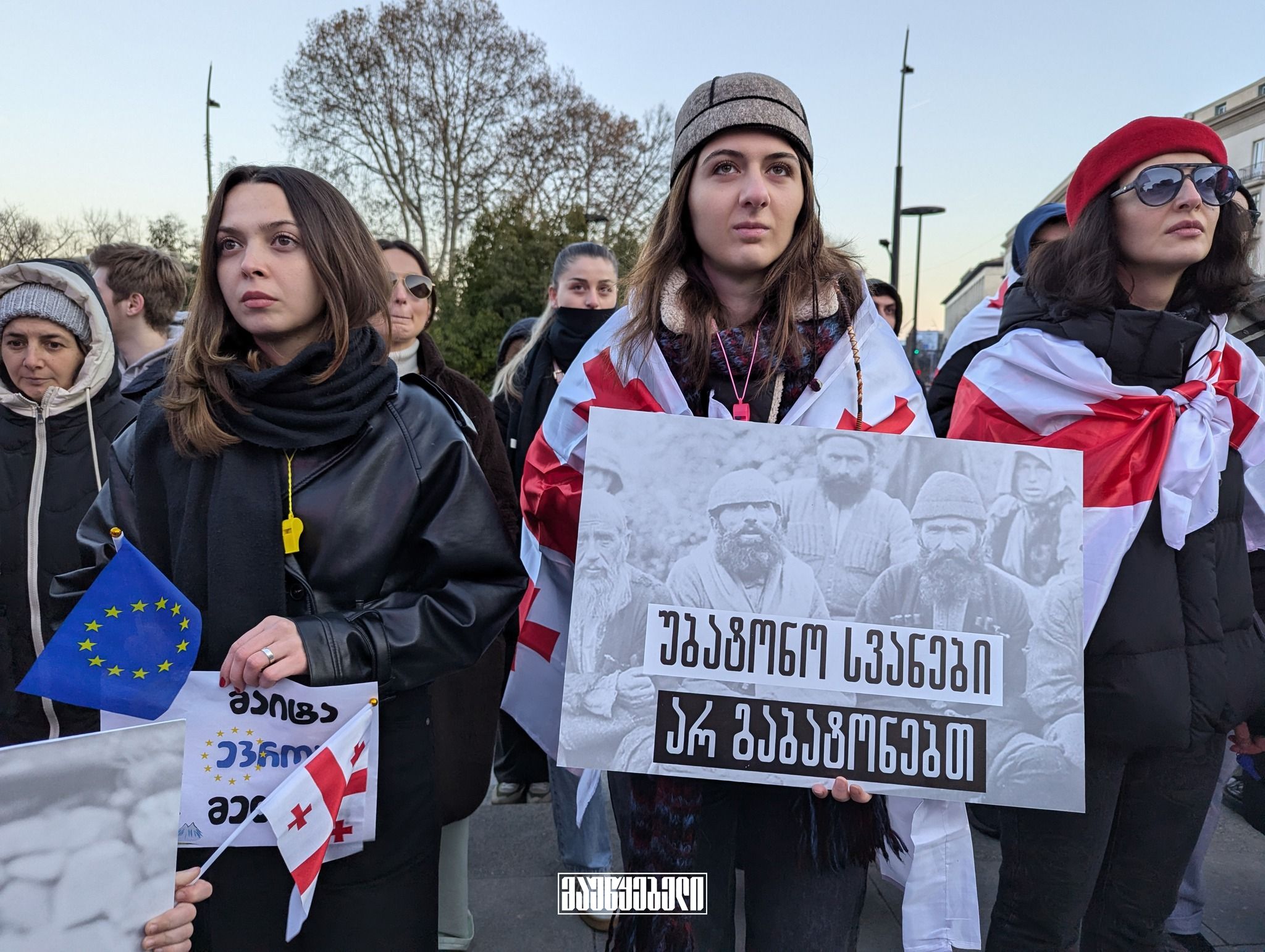
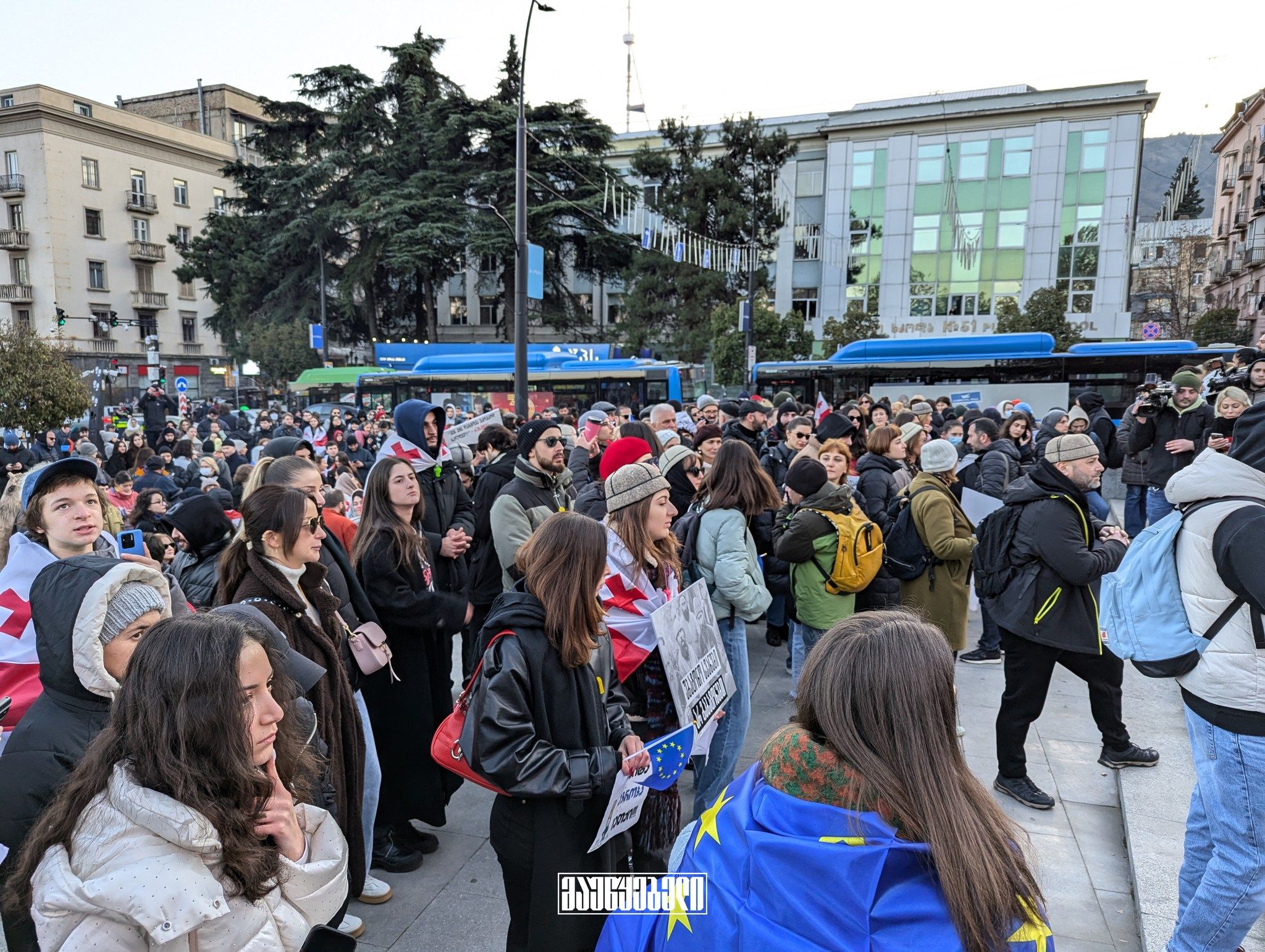
December 27
On December 27, the United States Treasury Department imposed sanctions on billionaire former Prime Minister Bidzina Ivanishvili, founder and honorary chairman of the Georgian Dream. Executive Order #14024, which served as the basis for Ivanishvili’s sanctions, imposes financial restrictions for promoting Russian interests and undermining democracies.
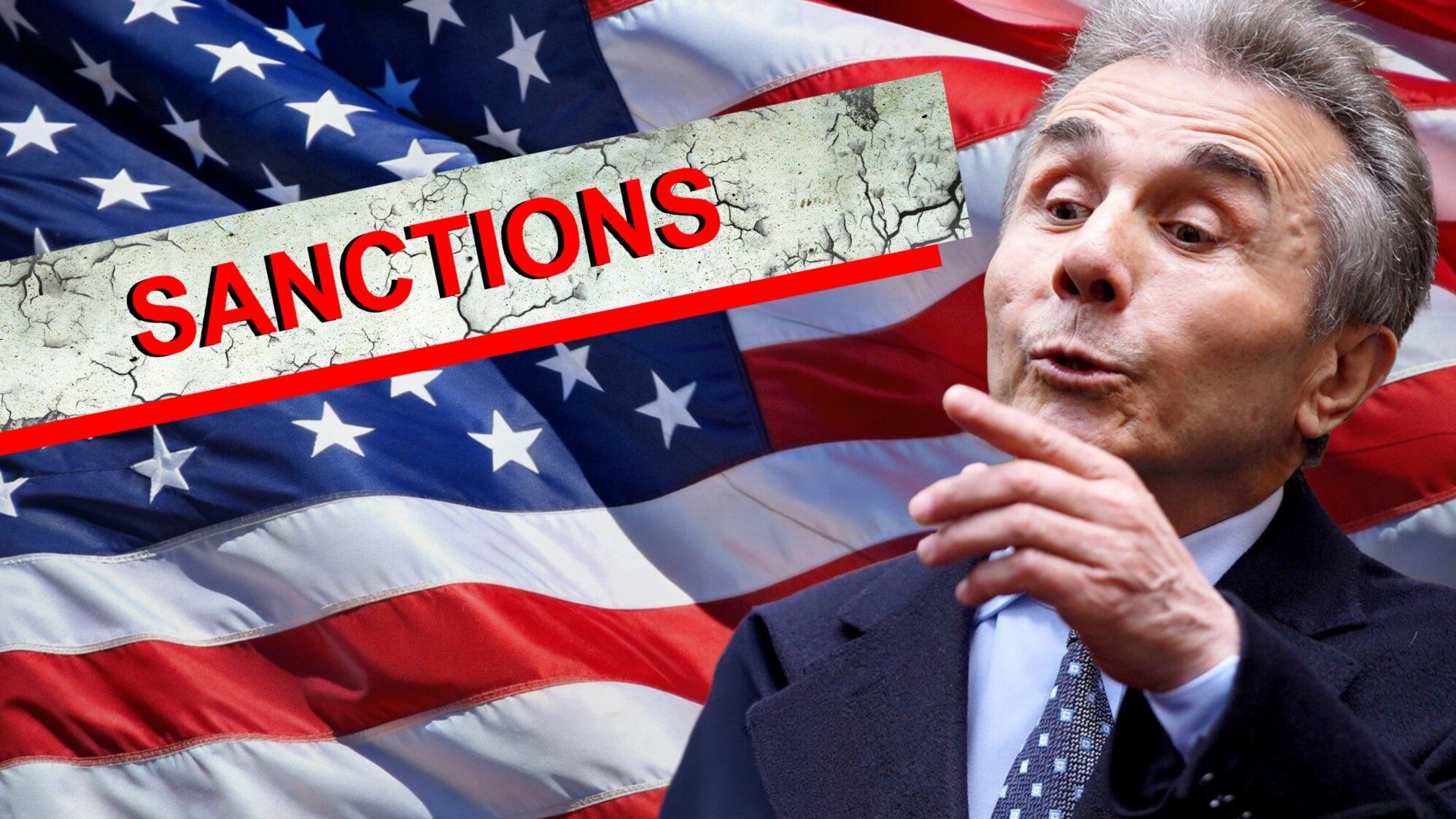
December 28
"Chain of Unity" In various cities of Georgia - Tbilisi, Batumi, Zugdidi, Kutaisi, Gori, Rustavi, Kvareli... - participants of pro-European demonstrations formed a human chain. The demonstrators demanded the release of those detained during the demonstrations and new elections.
December 31
Tens of thousands of people celebrated the New Year together on Rustaveli Avenue, near the Parliament building. The population spread a New Year's table almost a kilometer long in the middle of the highway. When the New Year came, the President of Georgia, Salome Zurabishvili, joined the participants of the rally. A special cordon was set up for her.
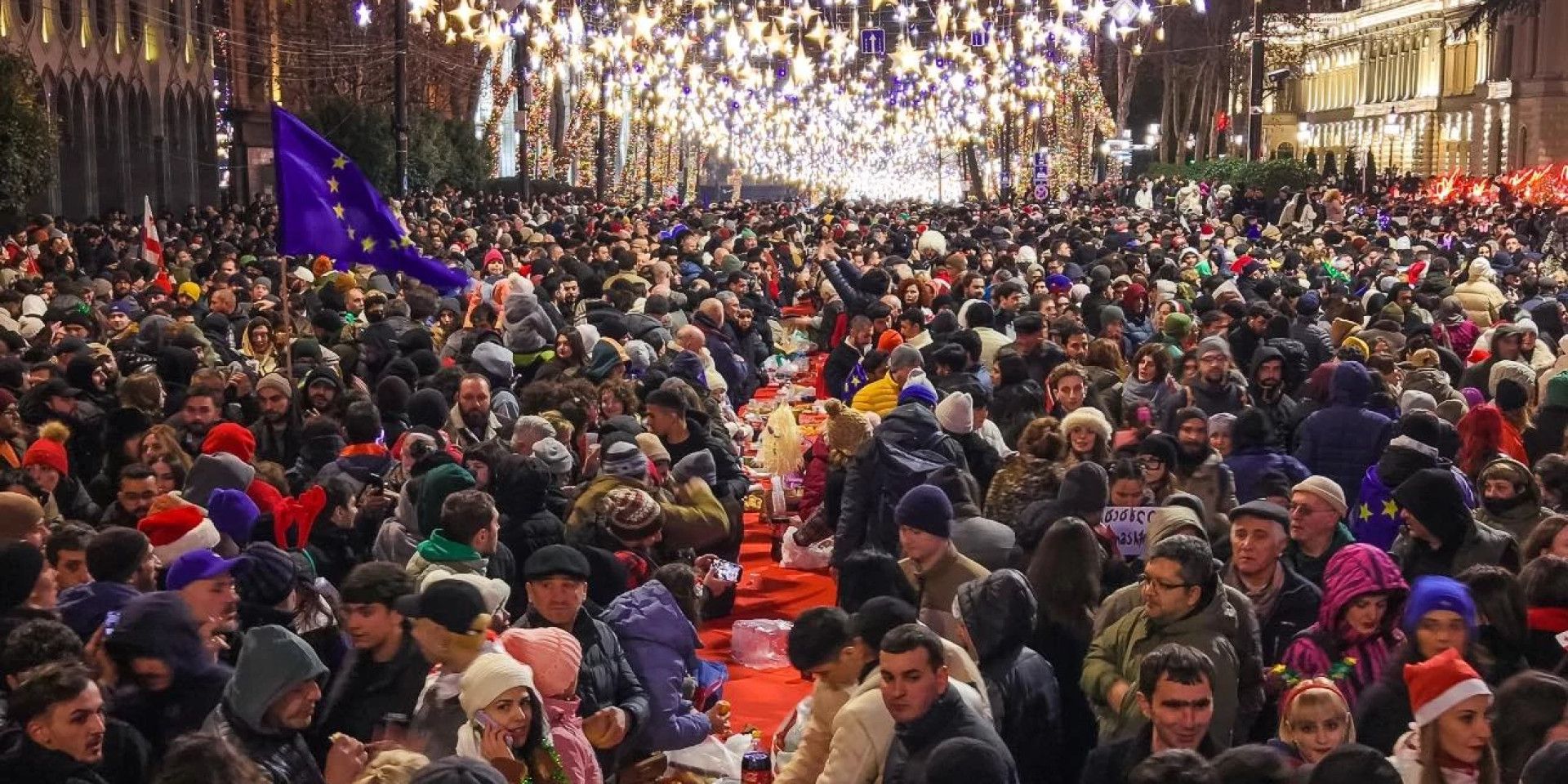
January 2, 2025
“Let's celebrate Bedoba together” — Citizens celebrated Bedoba together on Rustaveli Avenue
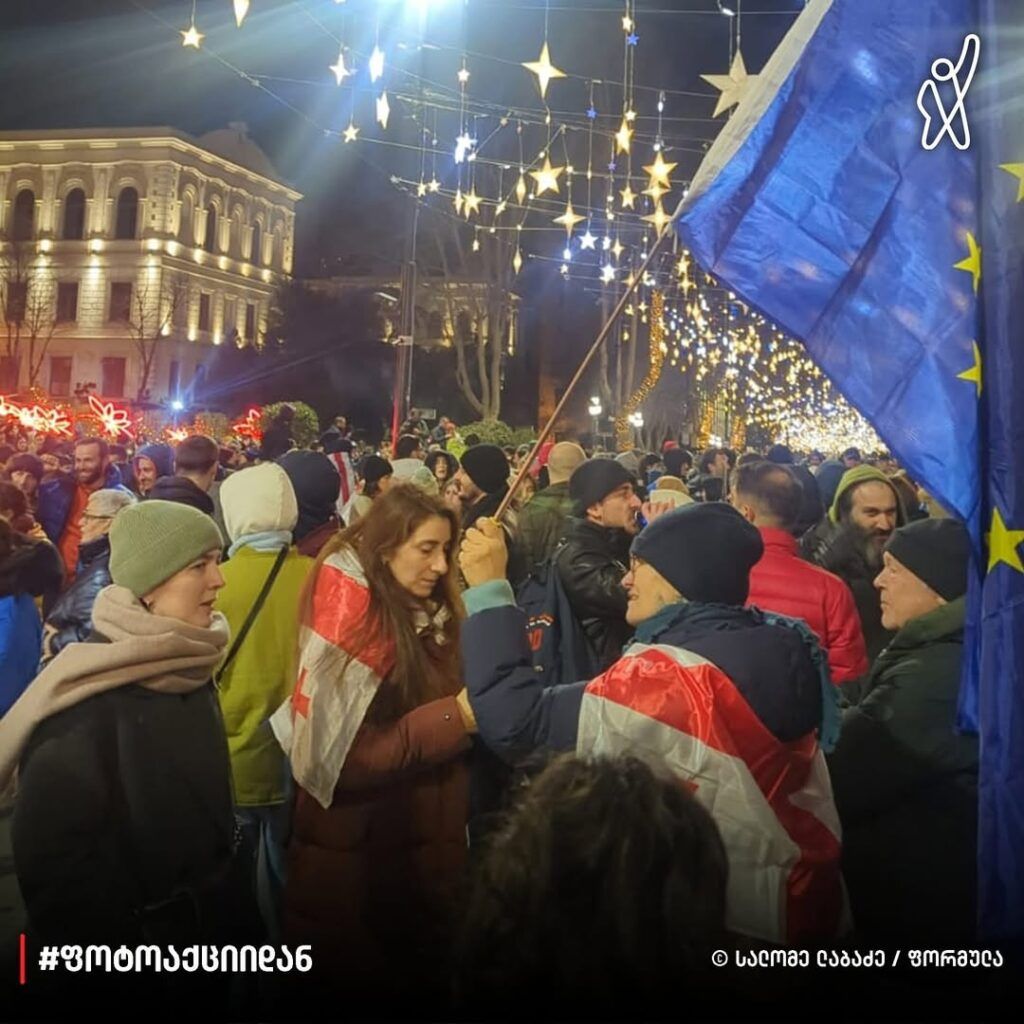
January 7
On Christmas Eve and the 40th day of continuous pro-European protests, people met again on Rustaveli. At 8 pm, several streams of people from five churches in Tbilisi set off simultaneously with lit candles in their hands and met in front of the Kashveti, where they celebrated Christmas together.
January 11, 2025
Mzia Amaglobeli was arrested twice in one night - first for putting up a "Swear" sticker at a protest rally in front of the Batumi Police Department and the second time for slapping the Batumi Police Chief, Irakli Dgebuadze. On January 14, the Batumi District Court sentenced Mzia Amaglobeli to two months in prison as a preventive measure, and his charge was formulated as follows - "attack on a police officer", which implies 4 to 7 years in prison. Mzia Amaglobeli, a 49-year-old journalist, founder of "Batumelebi" and "Netgazeti", was on a hunger strike from January 11 to February 18 (38 days).
Mzia Amaglobeli, a 49-year-old journalist, founder of Batumelebi and Netgazeti, who is being held on charges of "assaulting a police officer," has been on a hunger strike since January 11. According to the organization defending his interests, the Young Lawyers' Association, his life is in danger and as of January 30, "he is already having difficulty walking the distance needed to meet with a lawyer." (Information subject to update)
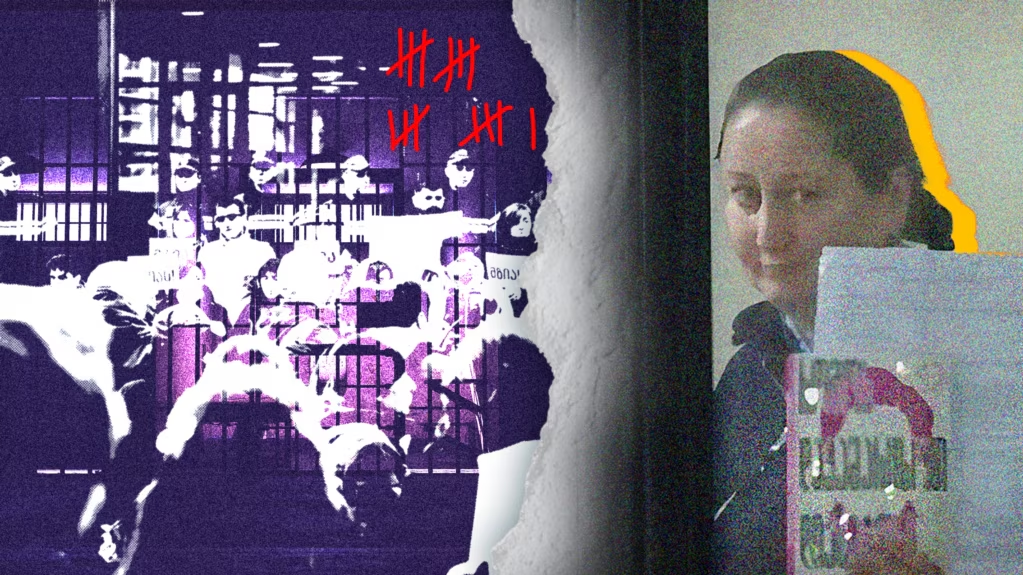
January 17, 2025
Batumi medroshe, Temur Katamadze, began his hunger strike on this day and ended it on the 48th day due to deteriorating health. The police are accusing him of not having the right to live in Georgia.
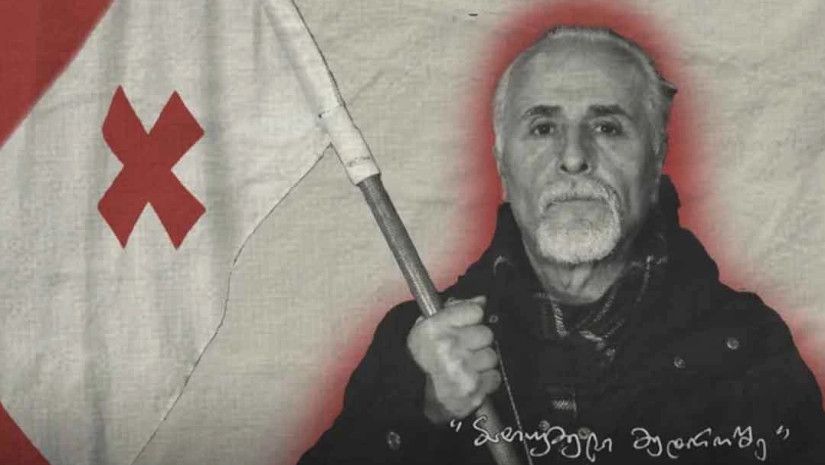
January 23
Vaso Abashidze's New Theater presented a protest manifesto to the public. The artistic director of the "New Theater", Davit Doiashvili, stated in the protest manifesto of the actors and directors that the "New Theater" will tour the regions, they will go everywhere and talk to everyone.
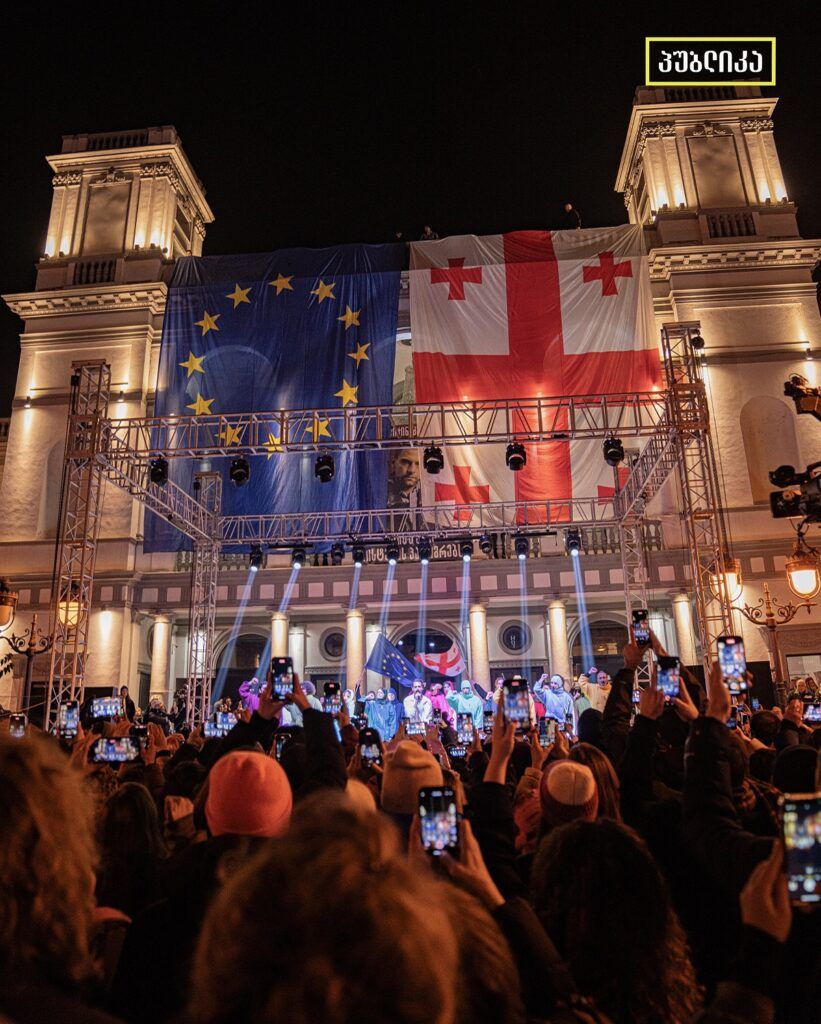
According to him, they have been trying to establish a dialogue with the prosecutor's office until now, but as he noted, the prosecutor's office did not notice this. Davit Doiashvili issued an ultimatum to the government on January 12. The creative group demanded the release of their theater actor Andro Chichinadze and other activists who were arrested during the demonstrations.

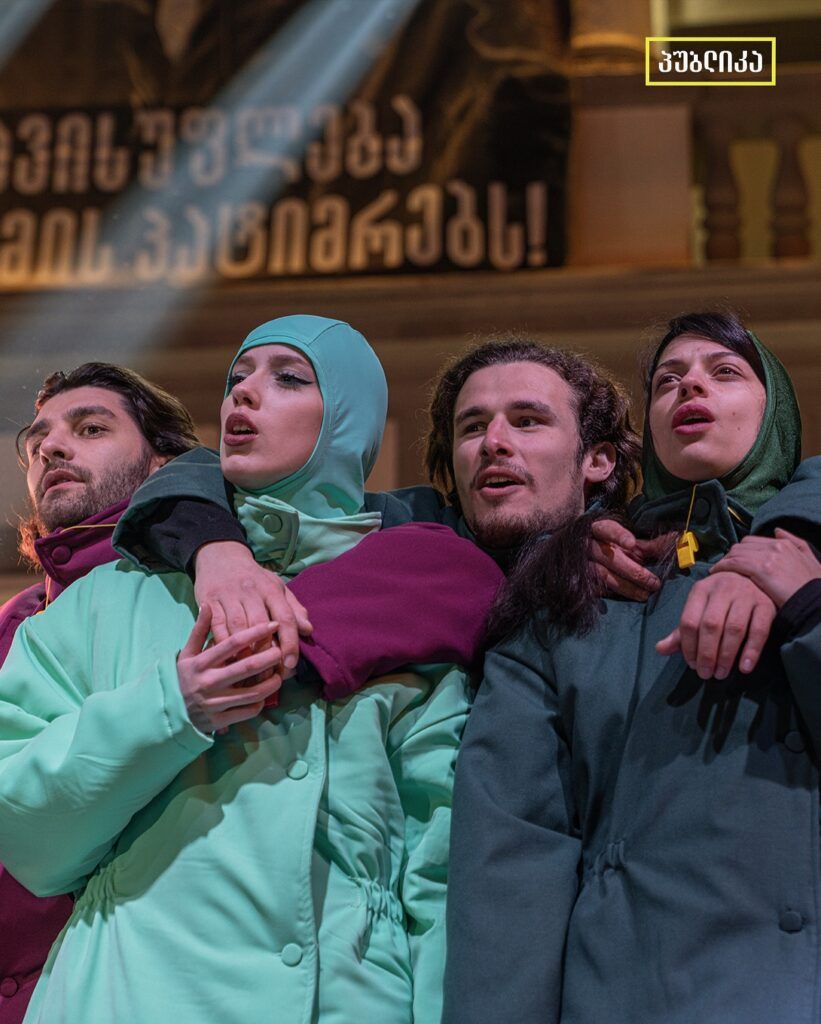
“Here, I’m starting to announce – “Akhali Teatri” is going to the regions – we will go everywhere and talk to everyone, and you will definitely see what the theater can do. Everyone will join us. We will definitely spread throughout the regions. Go to the Georgian Theater, go! You know that security will do a billion things, throw out a billion things when we go to the regions. Then, you will ask me why I am doing this – because at this time I remember the words of a genius – a person who exchanges security for freedom is neither worthy of security nor freedom,” said Davit Doiashvili, the artistic director of the “Akhali Teatri”.
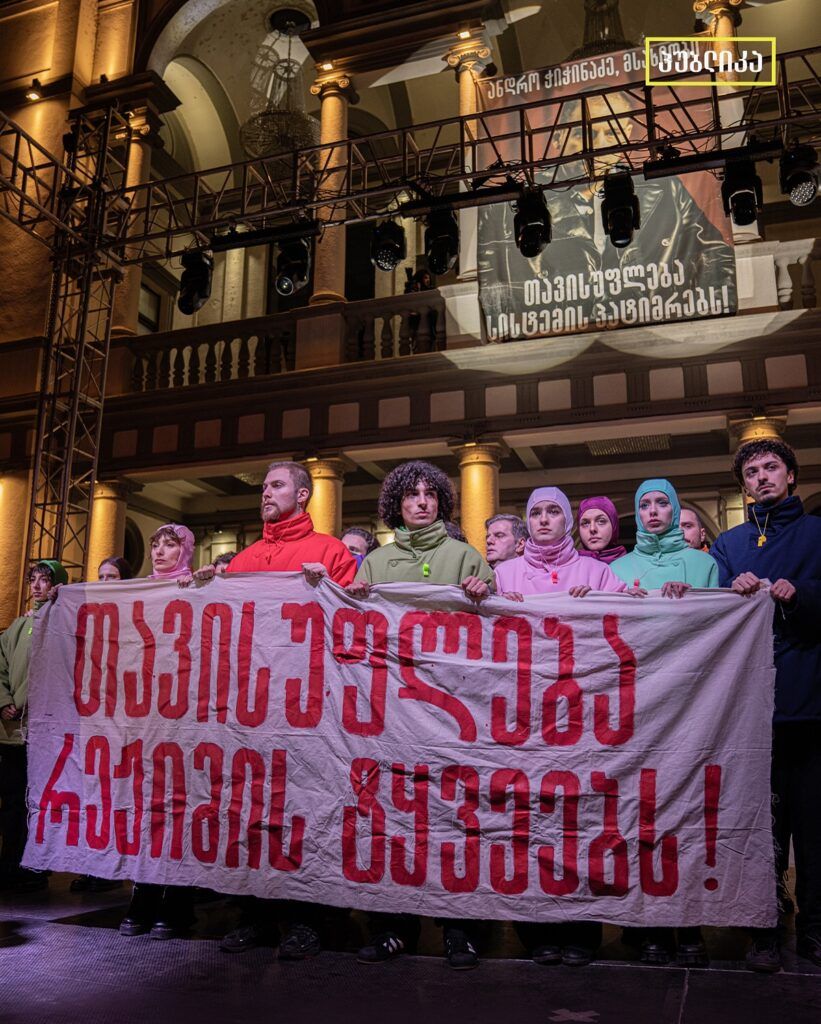
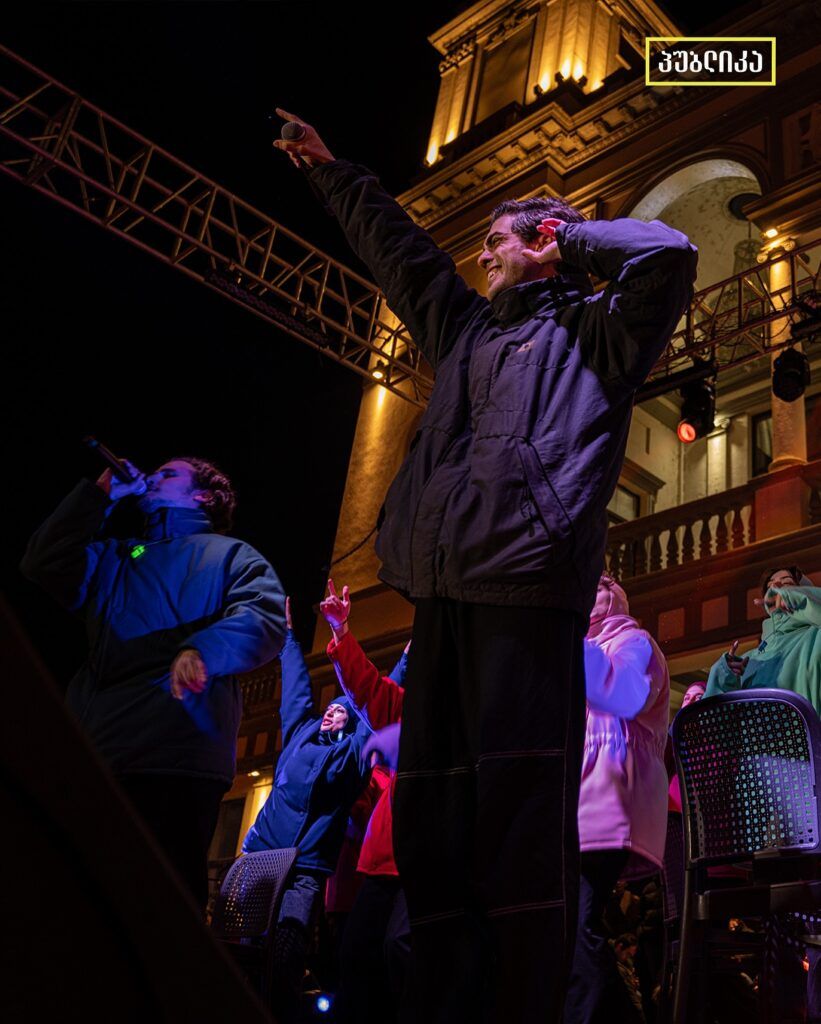
During the protest manifesto, actors addressed the citizens gathered near the theater from the stage and noted that there are strong and unbroken people standing on the streets of Georgia. They also read a letter from actor Andro Chichinadze to the citizens.
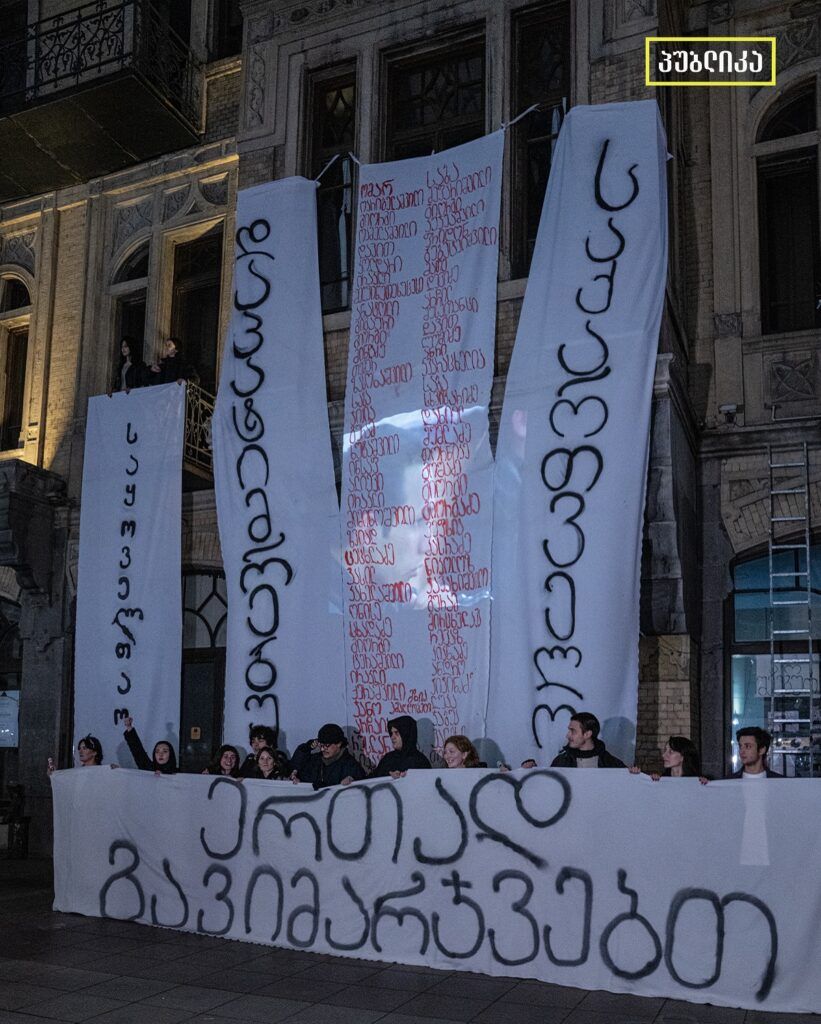
January 24
The form of the protest became increasingly creative. Since this morning, music and various appeals could be heard from the payment machines of Tbilisi buses and minibuses. At the request of the city hall, the payment machines were turned off for about an hour.
The Ministry of Internal Affairs has launched an investigation under the Criminal Code into the case of the inclusion of protest audio recordings on Tbilisi public transport, buses and minibuses. In addition, a part of the public has started to make inscriptions on banknotes. "Freedom to the prisoners of the regime," they write on paper money and distribute photos on social media.
January 29
In response to the adoption of a critical resolution by the Parliamentary Assembly of the Council of Europe (PACE), the Georgian Dream party says it is suspending its membership in the Parliamentary Assembly of the Council of Europe. Shortly before that, PACE adopted a resolution calling on the Georgian authorities to release political prisoners and call new parliamentary elections by April 2025. In addition, PACE, by its decision, recognized the Georgian Dream delegation’s authority as “limited” – with a number of reservations – and stated that it would return to consider the issue in April 2025. The Georgian Dream’s decision is likely to result in the termination of its membership.
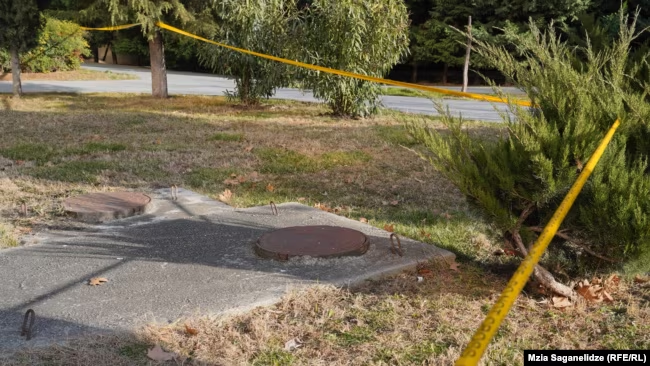
On the same day, it became known that 16-year-old Ioseb Adeishvili died on January 25 in the private territory of Rike Park - near Rike Docks - in Tbilisi.
It is unknown how the 16-year-old teenager ended up in an area that turned out to be life-threatening, along with his peers.
"The tragedy occurred in a building on private territory," Tbilisi City Hall said, adding that the information about a 16-year-old boy falling into an open ditch in Rike Park is incorrect.
"Rike's Docks" were sold on March 24, 2022. It was sold at auction by the National Agency for State Property on the sixth attempt - the investor was given 14,591 sq. m. of land with the so-called "Rike's Docks" located on it for 10,020,000 GEL, which was almost 10 times cheaper than the original cost. Later it turned out that "Rike's Docks" was bought by Davit Khidasheli, a businessman close to the government.
January 30
Mikheil Kavelashvili, who was elected president by the collegium with a majority of votes from the Georgian Dream, awarded senior police officers for their "special contribution to strengthening law and order." Most of the senior officers awarded the Order of Honor have been sanctioned by the European Union and the United States for their brutal crackdown on pro-Western demonstrations in Tbilisi.
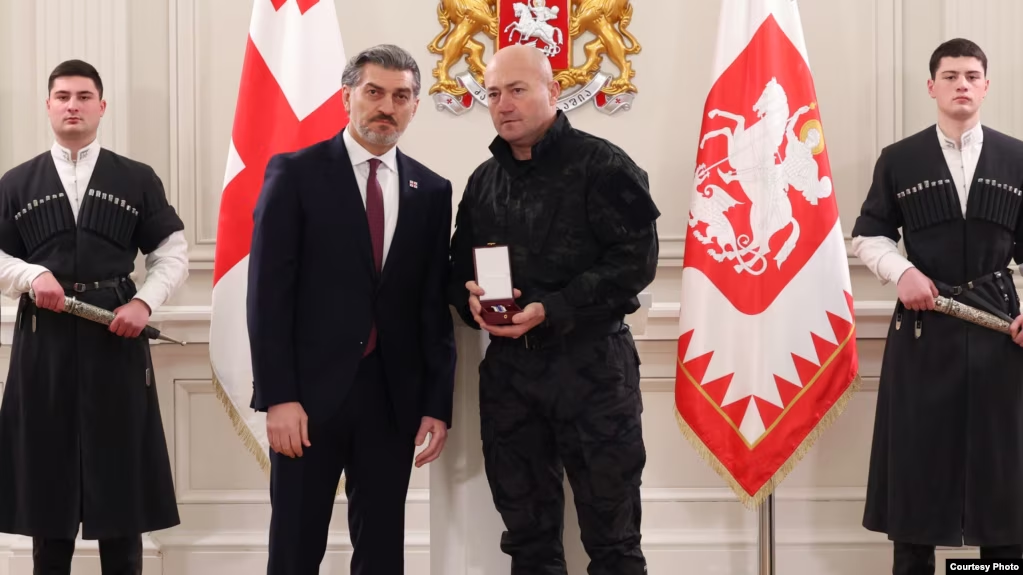
On the same day, a new sanction was added - the Czech Republic imposed sanctions on three high-ranking officials of the Ministry of Internal Affairs of the Georgian Dream government in Georgia. The information was released by the Czech Minister of Foreign Affairs, Jan Lipavsky. “Today, on my initiative, the government imposed sanctions on three employees of the Ministry of Internal Affairs. The reason is their direct responsibility for the brutal suppression of protests in Georgia last year. We do not want them in the Czech Republic,” he wrote on Platform X. According to the minister, this is the first time that the Czech Republic has imposed sanctions for human rights violations.
Chapter VII: February - Protests Enter a New Phase
February 2 - Protest at the entrance to Tbilisi
On the 67th day of continuous protests, police began detaining citizens at the ongoing protest rally at the entrance to Tbilisi, near the Tbilisi Mall shopping center, at approximately 6 p.m. - at that time, traffic on the highway was not blocked for vehicles.
After the announcement of this action, the state hastily passed a law that made blocking roads a punishable act under the Criminal Code.
February 6
The Georgian Dream parliament has approved amendments restricting freedom of protest and expression.
🔹For petty hooliganism, for which the police often detain many demonstrators at rallies, the detainee was given an even larger fine;
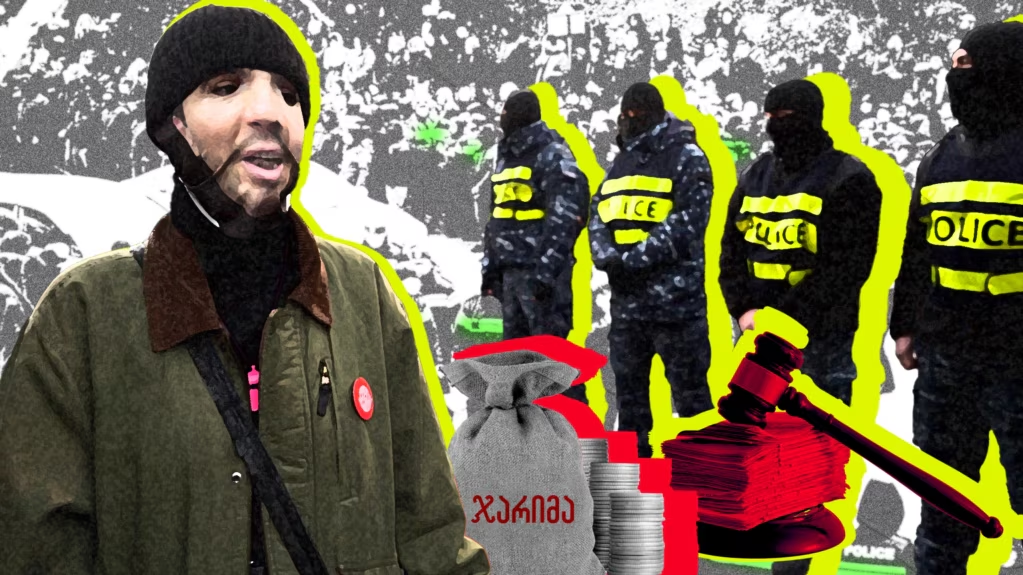
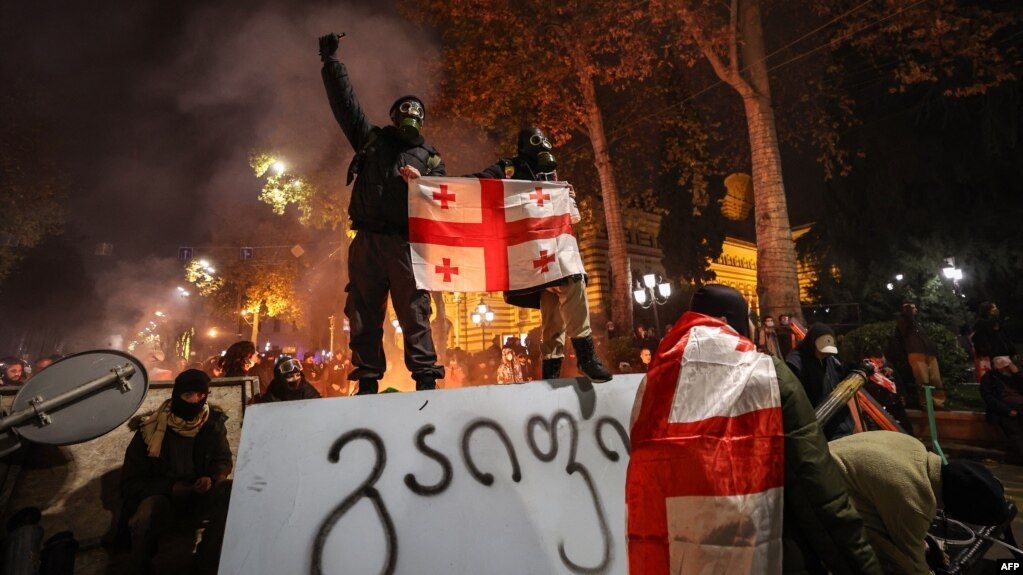
🔹The term of administrative imprisonment for petty hooliganism has also been increased from 15 to 60 days;
🔹 Verbal insult of a state political official in connection with his/her activities has been defined as an administrative offense;
🔹It is prohibited to hold rallies in privately owned public spaces (for example, shopping malls) without prior permission;
🔹Public incitement to violent acts, which was previously punishable only by a fine, will be punishable by up to 3 years in prison;
🔹The punishment for resisting, threatening, and using violence against a police officer will be increased and will be punishable by 5 to 6 years in prison.

February 15
Two children died in the "City of Dreams" area of Batumi - they fell into a well filled with water.
Locals say that the area where construction equipment was already operating was not fenced off.

About 1,000 families live in this settlement in extremely difficult conditions. The issue of a safe environment for life arose immediately after the settlement was established. The settlement was constantly threatened by fire, floods, and flooding of huts. Now, part of the territory of the so-called Dream settlement is a settlement, where construction materials are scattered, and part of the territory is being prepared for a construction site, although there is no signboard here and the territory is not fenced off.
February 16
"If this were your child..." - citizens held a protest near the Ministry of Economy, which was related to the tragedy that occurred the previous night.
GYLA believes that the death of two minors in Batumi cannot be considered a mere accident. They say that the tragedy confirms the inaction of state structures and the violation of obligations regarding the right to life.
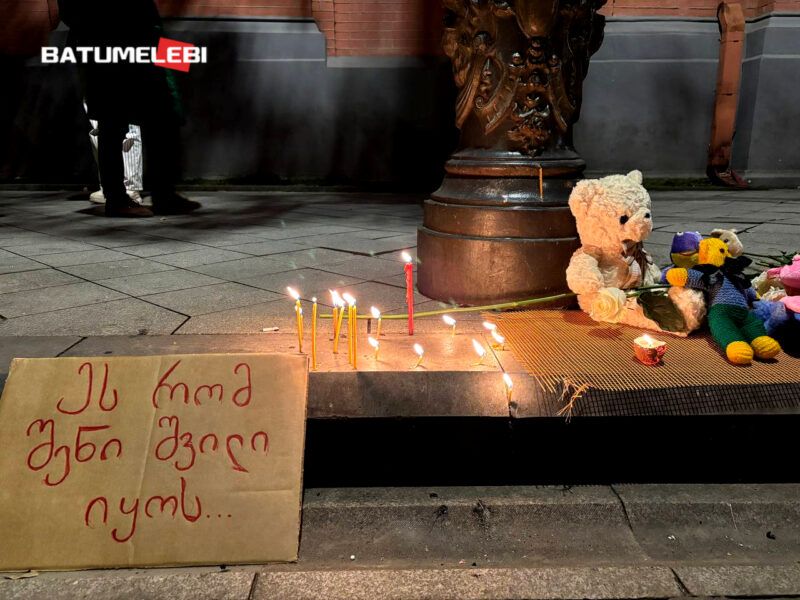
February 18
On the 83rd day of continuous protests, civic activists unfurled banners from bridges in various cities.
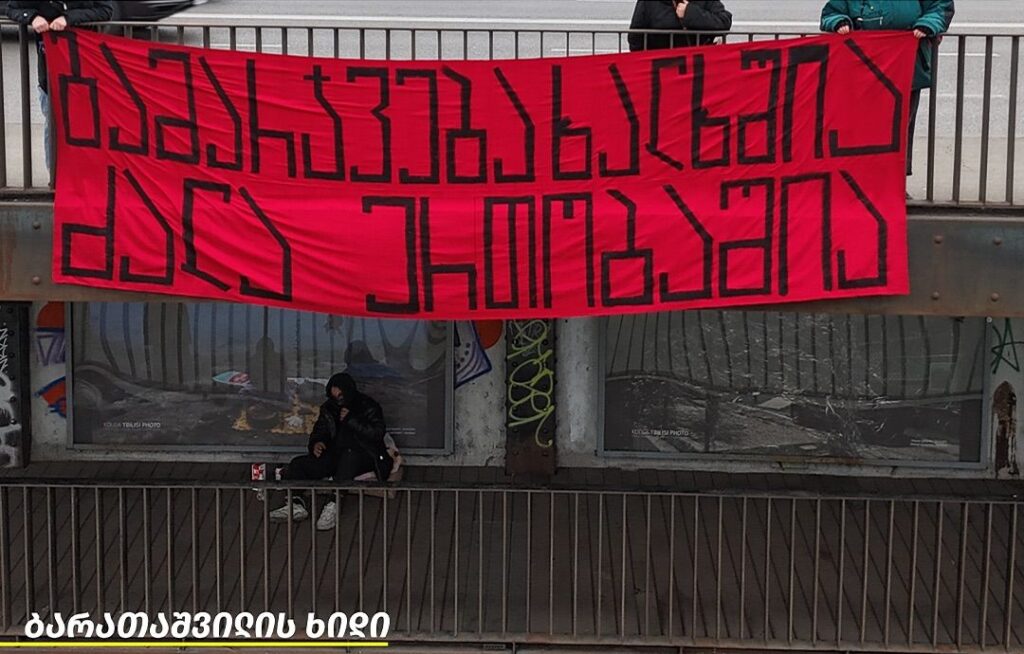
Citizens "celebrated" Bidzina Ivanishvili's birthday with a rally and protest performances near the parliament.
February 25
On the Day of Soviet Occupation, 23 protest rallies and marches were held in Tbilisi and the regions.
At 4:00 PM, employees and employers, the people who create the country's economy, went on strike in front of their workplaces, and then joined the march from various locations towards Heroes' Square.
Heavy snowfall in Guria
On February 25, information spread through social media that heavy snowfall in western Georgia, especially in Guria, was threatening people's lives. It turned out that despite the danger, the relevant agencies had not responded and rescue operations had not yet begun.
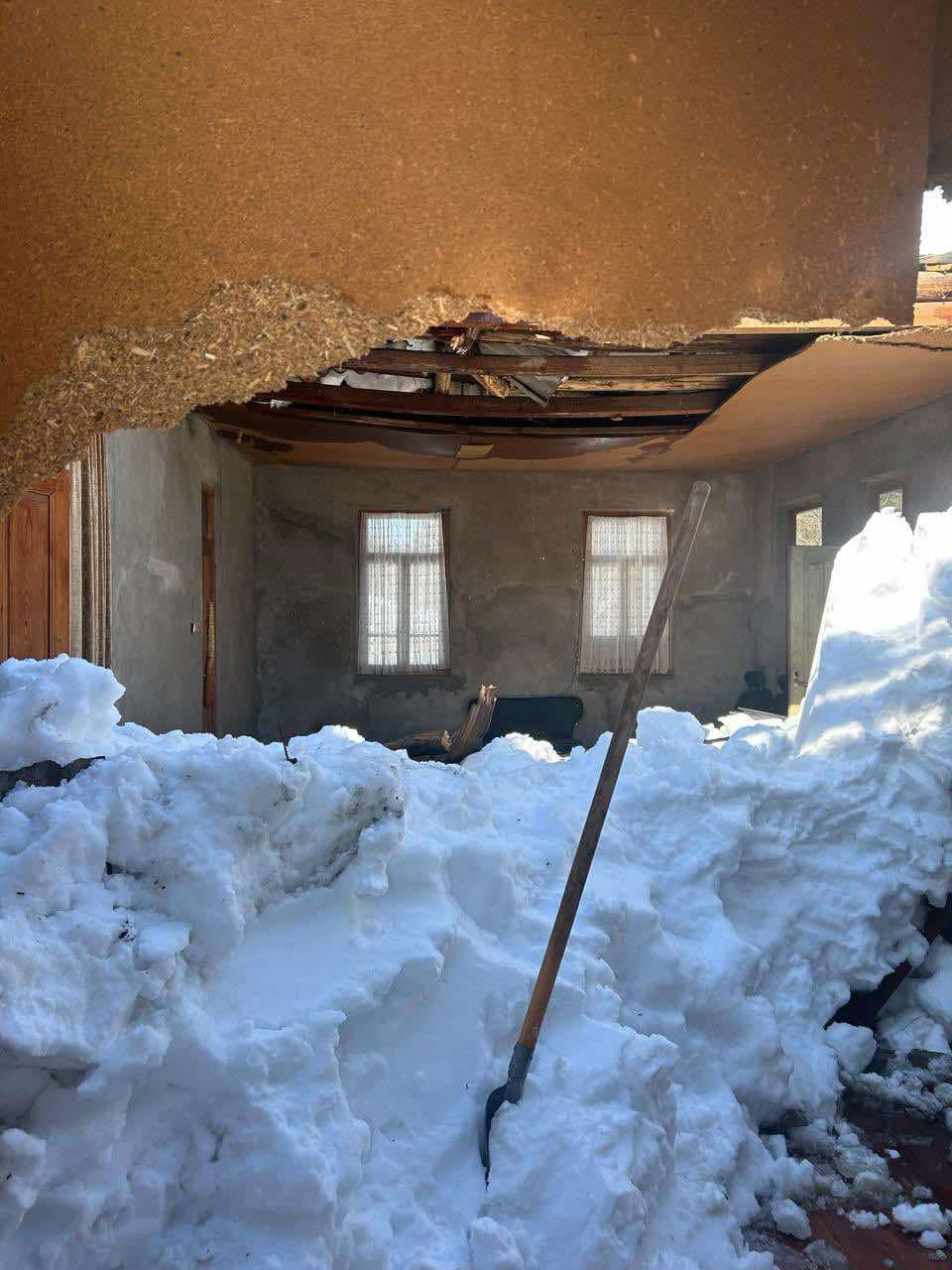
Ordinary citizens decided to come to Guria and help the locals. For several days, they helped families left behind in different villages, bringing food, medicines, and clearing yards of snow. A special website - Moxalise.ge and a Facebook group "Volunteers for Guria" were created to disseminate information.
The de facto government only then got involved in the fight against the disaster, and government propagandists began to spread information that the Georgian Dream had helped the people promptly and that there was no longer a need for volunteers. At the same time, horrifying footage filmed by volunteers was being circulated on social media, showing that the disaster was still a big problem for the locals.
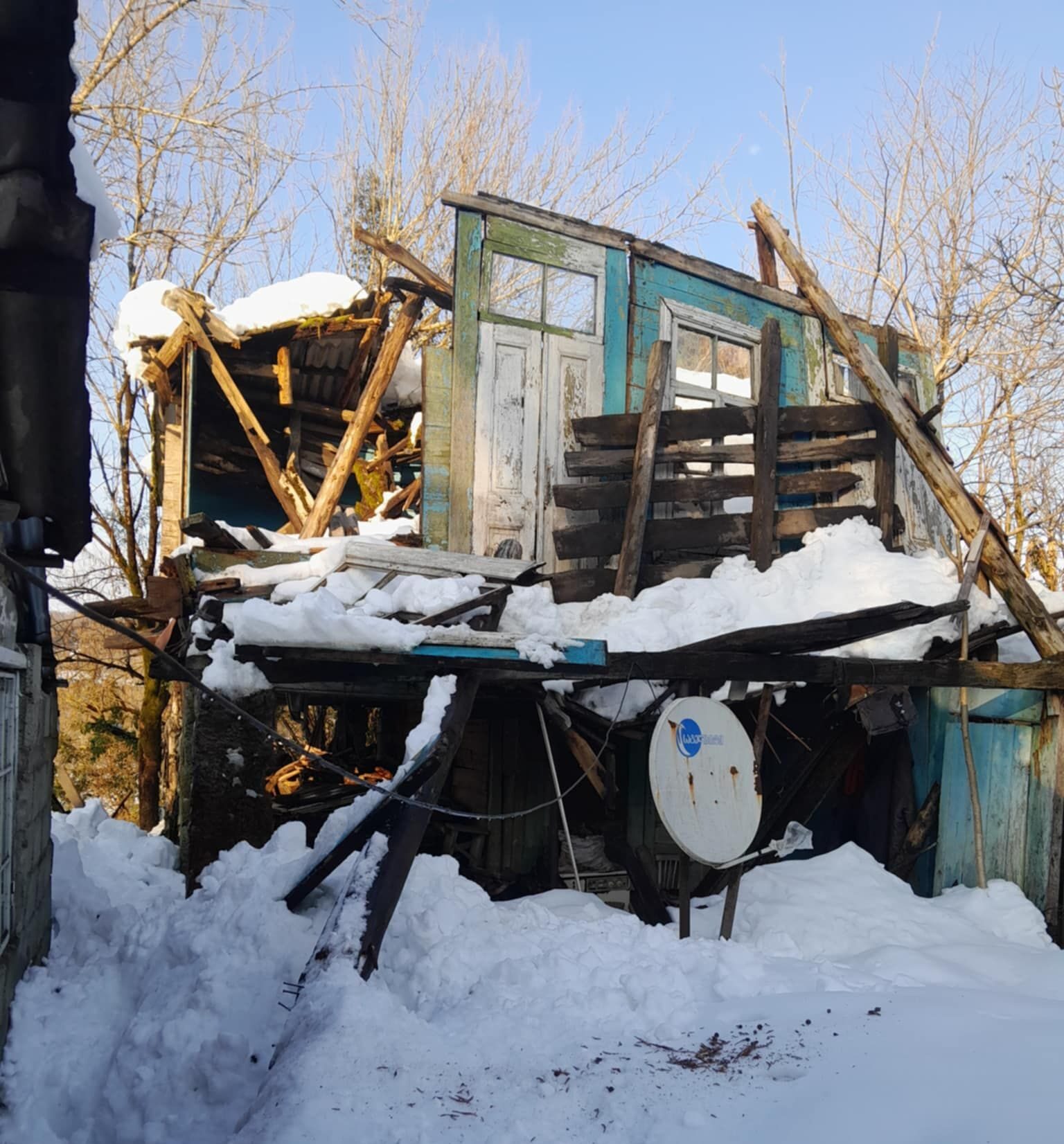
February 28
The European Court of Human Rights in Strasbourg, as part of an interim measure, has banned Georgia from extraditing the exiled journalist and editor Afgan Sadigov to Azerbaijan until his case is resolved on the merits in the Strasbourg court. In light of this important decision, Afgan Sadigov has ended his long (161-day) hunger strike.
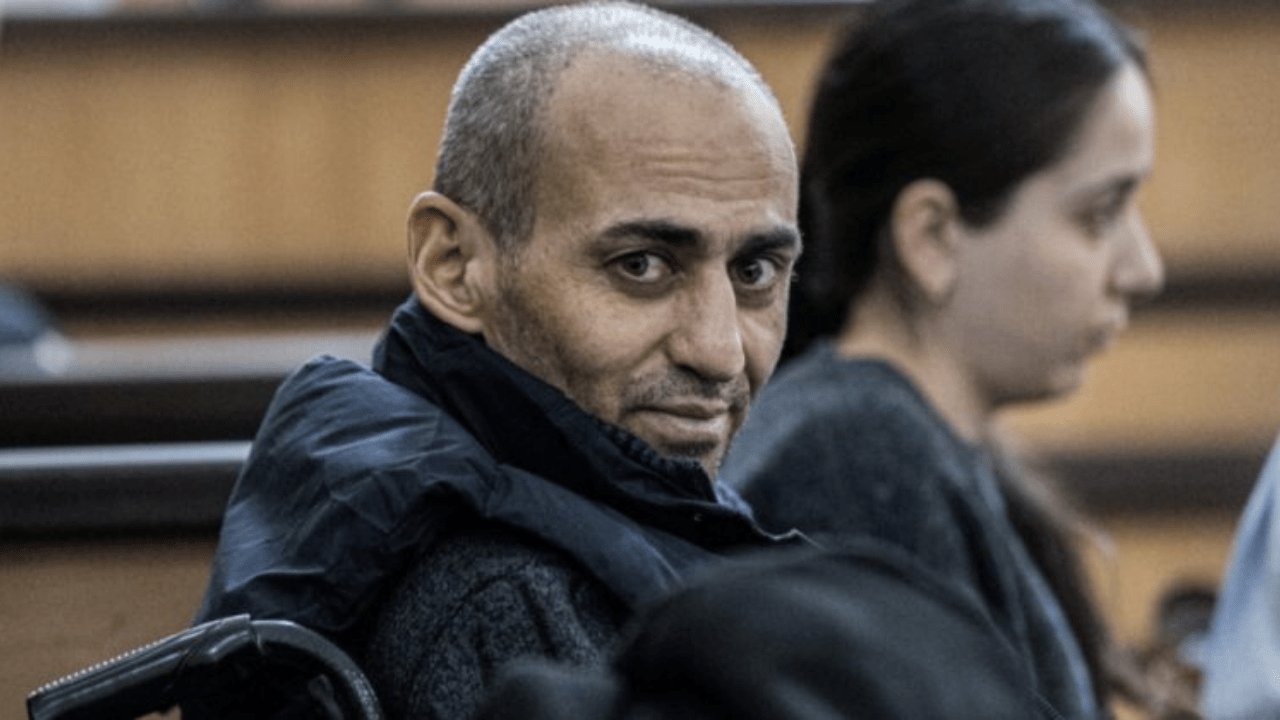
March 3
The Venice Commission publishes a report on the legislative amendments introduced by the Georgian Dream parliament that restrict the freedom of protest and expression.
As the report published by the commission states, the draft laws were adopted "hastily" without the involvement of relevant stakeholders, which "undermines the legitimacy of these changes, especially given the broader political context of the mass protests."
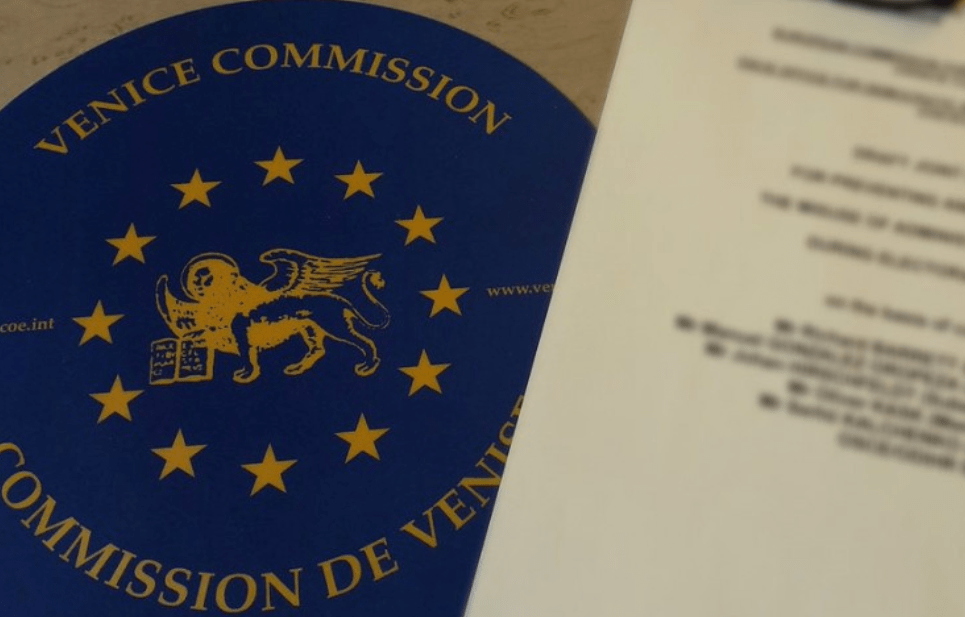
As the report published by the commission states, the draft laws were adopted "hastily" without the involvement of relevant stakeholders, which "undermines the legitimacy of these changes, especially given the broader political context of the mass protests."
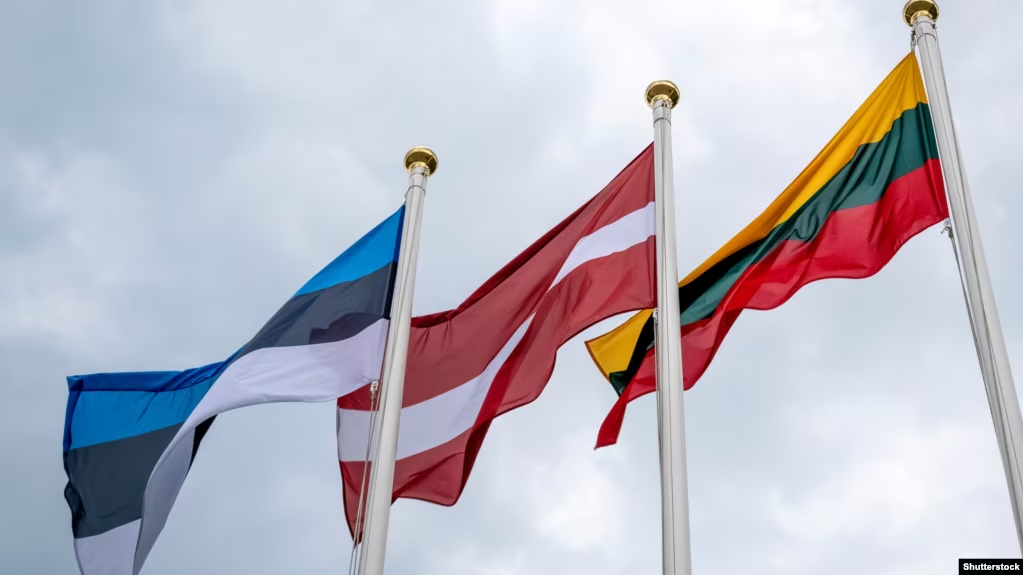
The Baltic states of Lithuania, Latvia, and Estonia have expanded sanctions against Georgia, banning dozens of people — judges, prosecutors, police officers, members of the Georgian Dream party, and other related figures — from entering their countries.
March 4
The Georgian Dream parliament supported the restrictive laws at the first reading during the plenary session:
🔹Restrictive amendments to the Law on Broadcasting;
🔹The draft of the Foreign Agents Registration Act (FARA);
🔹Removing the term "gender" from the legislative space of Georgia;
🔹Article of "Treason".
